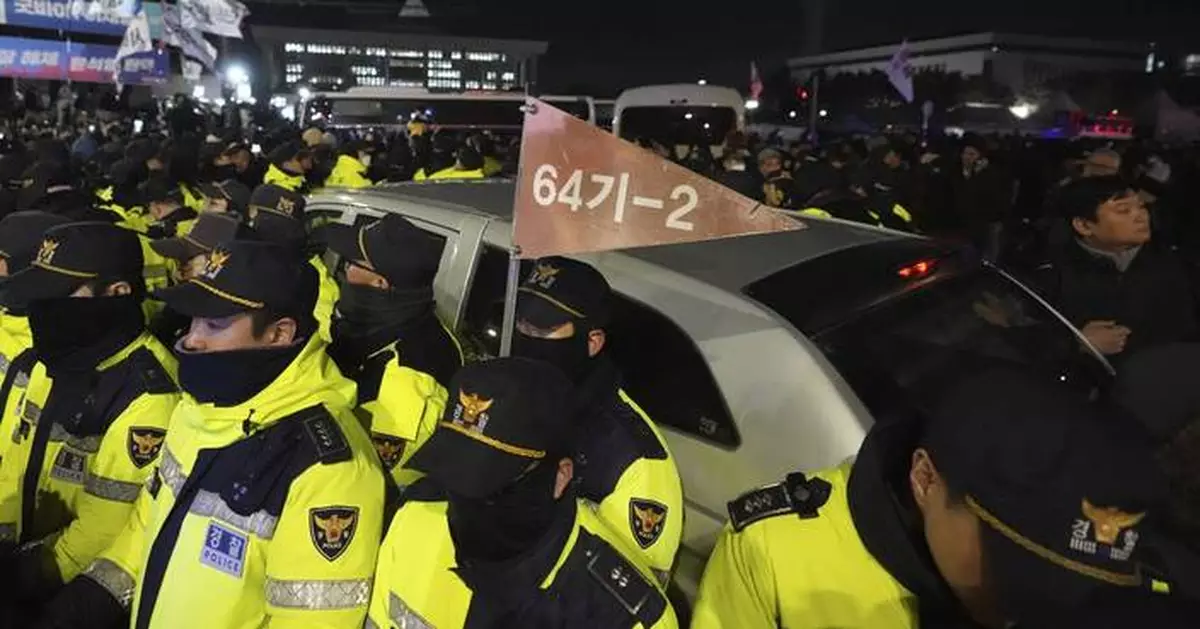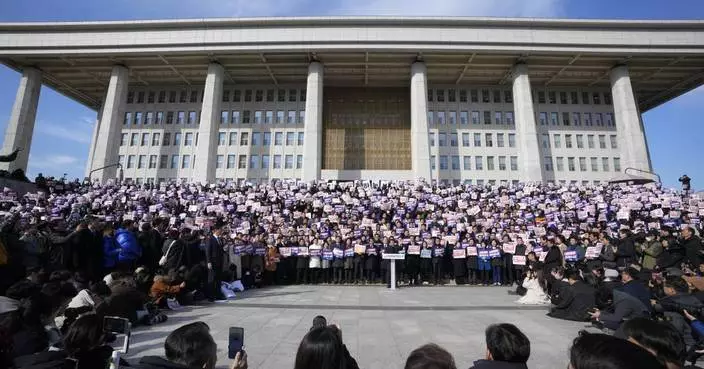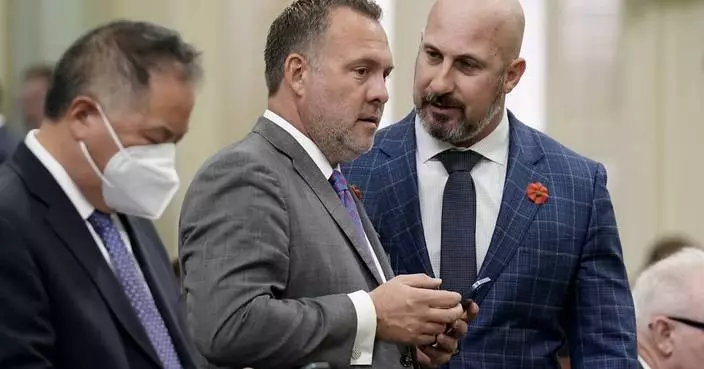TOKYO (AP) — South Korea's President Yoon Suk Yeol faced parliamentary moves to impeach him after he sent heavily armed forces into Seoul's streets with his baffling and sudden declaration of martial law that harkened to the country’s past dictatorships.
Opposition parties submitted the impeachment motion just hours after parliament unanimously voted to cancel Yoon's declaration, forcing him to lift martial law about six hours after it began. Impeaching Yoon requires the support of two-thirds of the National Assembly and at least six of the nine Constitutional Court justices. The liberal opposition Democratic Party holds a majority in the 300-seat parliament and has called for Yoon's resignation.
Click to Gallery
Members of main opposition Democratic Party stage a rally against South Korean President Yoon Suk Yeol at the National Assembly in Seoul, South Korea, Wednesday, Dec. 4, 2024. (AP Photo/Ahn Young-joon)
Protesters attend a rally to demand South Korean President Yoon Suk Yeol to step down in front of the National Assembly in Seoul, South Korea, Wednesday, Dec. 4, 2024. The signs read "Stop." (AP Photo/Ahn Young-joon)
Protesters stage a rally to demand South Korean President Yoon Suk Yeol to step down in front of the National Assembly in Seoul, South Korea, Wednesday, Dec. 4, 2024. The signs read "Punish." (AP Photo/Ahn Young-joon)
FILE - Mass students demonstrators demand the lifting of martial law and the resignation of Premier Shin Hyon-Hwack and Korean Central Intelligence chief Lt. Gen. Chun Doo-Hwan, in May 1980. (AP Photo, File)
FILE - Armed South Korean government martial law troops guard captured rebels in Gwangju (Kwangju), South Korea, on May 27, 1980. The rebels were rounded up following the government's recapture by the riot-battered city. (AP Photo/Sadayuki Mikami, File)
In this photo provided by South Korea Presidential Office, South Korean President Yoon Suk Yeol speaks during a press briefing at the presidential office in Seoul, South Korea, Tuesday, Dec. 3, 2024. (South Korea Unification Ministry via AP).
A National Assembly staff sprays fire extinguishers to block soldiers entering the main hall of the National Assembly in Seoul, South Korea, Wednesday, Dec. 4, 2024. (Jo Da-un/Yonhap via AP)
People gather to demand South Korean President Yoon Suk Yeol to step down in front of the National Assembly in Seoul, South Korea, Wednesday, Dec. 4, 2024. (AP Photo/Ahn Young-joon)
South Korean martial law soldiers try to enter the National Assembly compound in Seoul, South Korea, Wednesday, Dec. 4, 2024. (Cho Sung-bong/Newsis via AP)
Police officers stand outside the National Assembly in Seoul, South Korea, Wednesday, Dec. 4, 2024. (AP Photo/Lee Jin-man)
A vote on the impeachment motion could be as early as Friday, Democratic Party lawmaker Kim Yong-min said.
During the tense and shocking hours under martial law, heavily armed forces surrounded the parliament, backed by army helicopters and armored vehicles. Lawmakers climbed walls to get into the building and held off troops by activating fire extinguishers. Politician and former news anchor Ahn Gwi-ryeong tried to pull away an assault rifle a soldier had pointed at her chest as she shouted: “Aren’t you ashamed of yourselves?”
The lawmakers who managed to reenter the building rejected Yoon’s martial law declaration 190-0, including 18 lawmakers from Yoon’s party, forcing Yoon to rescind it at a hastily assembled Cabinet meeting.
Here’s what to know about the situation in South Korea:
Yoon ordered martial law without warning in a speech late Tuesday where he vowed to eliminate “anti-state” forces he said were plotting rebellion and accused the main opposition parties of supporting the country’s rival, North Korea.
Yoon gave no direct evidence when he raised the specter of North Korea as a destabilizing force. Yoon has long maintained that a hard line against the North is the only way to stop Pyongyang from following through on its nuclear threats against Seoul.
In the late 1980s, South Korea had a series of strongmen who repeatedly invoked North Korea when struggling to control domestic dissidents and political opponents.
Yoon has struggled to get his agenda through an opposition-dominated parliament while corruption scandals involving him and his wife.
The opposition lambasted Yoon's actions as undemocratic. Opposition leader Lee Jae-myung, who narrowly lost to Yoon in the 2022 presidential election, called Yoon’s announcement “illegal and unconstitutional.”
The sudden declaration was also opposed by the leader of Yoon's own conservative party, Han Dong-hoon, who called the decision wrong and vowed to “stop it with the people.”
“The people will block the president’s anti-constitutional step. The military must be on the side of the public in any case. Let’s resolutely oppose it,” Kim Dong Yeon, the opposition party governor of Gyeonggi province, which surrounds Seoul, wrote on X.
Average South Koreans were in shock. Social media was flooded with messages expressing surprise and worry over Yoon’s announcement.
There were quick claims that the emergency declaration was linked to Yoon’s political struggles.
He has had little success in getting his policies adopted by a parliament that has been controlled by the opposition since he took over in 2022.
Conservatives have said the opposition moves are political revenge for investigations into Lee, who is seen as the favorite for the next presidential election in 2027.
Just this month, Yoon denied wrongdoing in an influence-peddling scandal involving him and his wife. The claims have battered his approval ratings and fueled attacks by his rivals.
The scandal centers on claims that Yoon and first lady Kim Keon Hee exerted inappropriate influence on the conservative ruling People Power Party to pick a certain candidate to run for a parliamentary by-election in 2022 at the request of Myung Tae-kyun, an election broker and founder of a polling agency who conducted free opinion surveys for Yoon before he became president.
Yoon has said he did nothing inappropriate.
South Korea became a democracy only in the late 1980s, and military intervention in civilian affairs is still a touchy subject.
During the dictatorships that emerged as the country rebuilt from the 1950-53 Korean War, leaders occasionally proclaimed martial law that allowed them to station combat soldiers, tanks and armored vehicles on streets or in public places to prevent anti-government demonstrations.
Such scenes are unimaginable for many today.
Dictator Park Chung-hee, who ruled South Korea for nearly 20 years before he was assassinated by his spy chief in 1979, led several thousand troops into Seoul in the early hours of May 16, 1961, in the country’s first coup. He proclaimed martial law several times to stop protests and jail critics.
Less than two months after Park’s death, Maj. Gen. Chun Doo-hwan led tanks and troops into Seoul in December 1979 in the country’s second coup. The next year, he orchestrated a brutal military crackdown on a pro-democracy uprising in the southern city of Gwangju, killing at least 200 people.
In the summer of 1987, massive street protests forced Chun’s government to accept direct presidential elections. His army buddy Roh Tae-woo, who had joined Chun’s 1979 coup, won the election held later in 1987 thanks largely to divided votes among liberal opposition candidates.
AP writers Kim Tong-hyung and Hyung-jin Kim in Seoul, South Korea, contributed to this story.
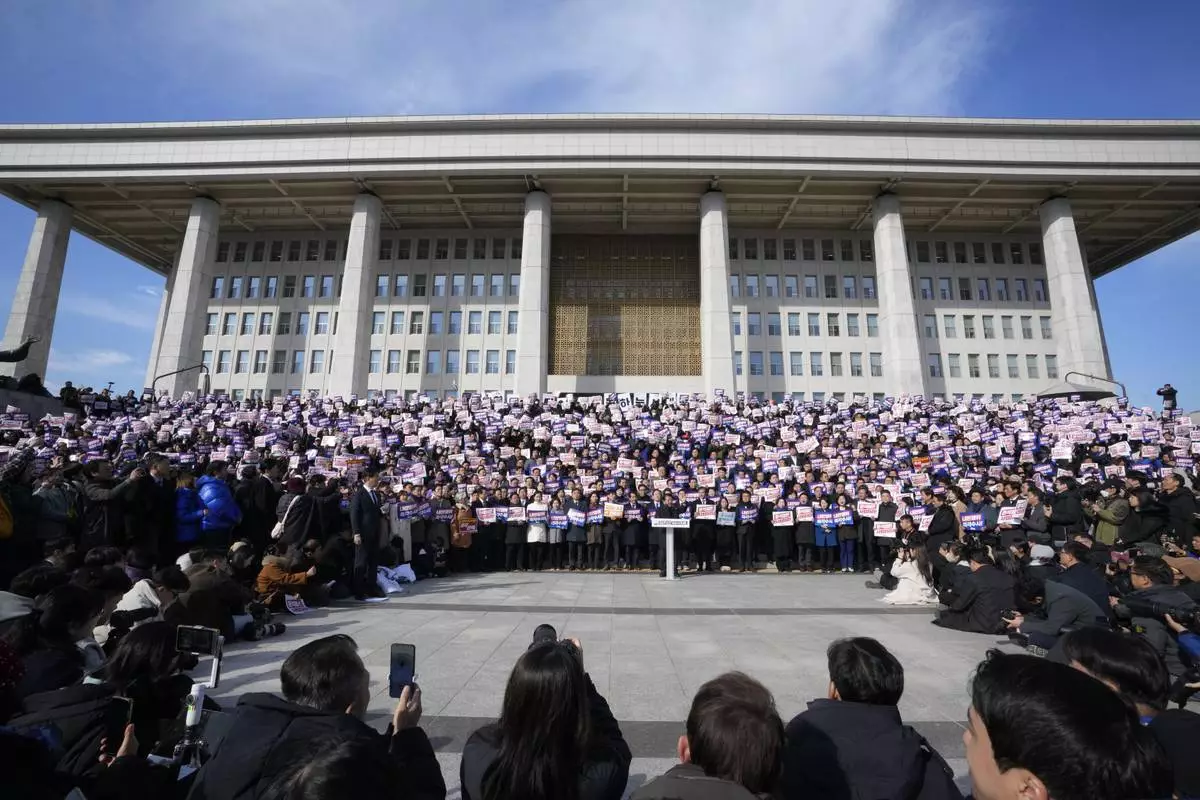
Members of main opposition Democratic Party stage a rally against South Korean President Yoon Suk Yeol at the National Assembly in Seoul, South Korea, Wednesday, Dec. 4, 2024. (AP Photo/Ahn Young-joon)
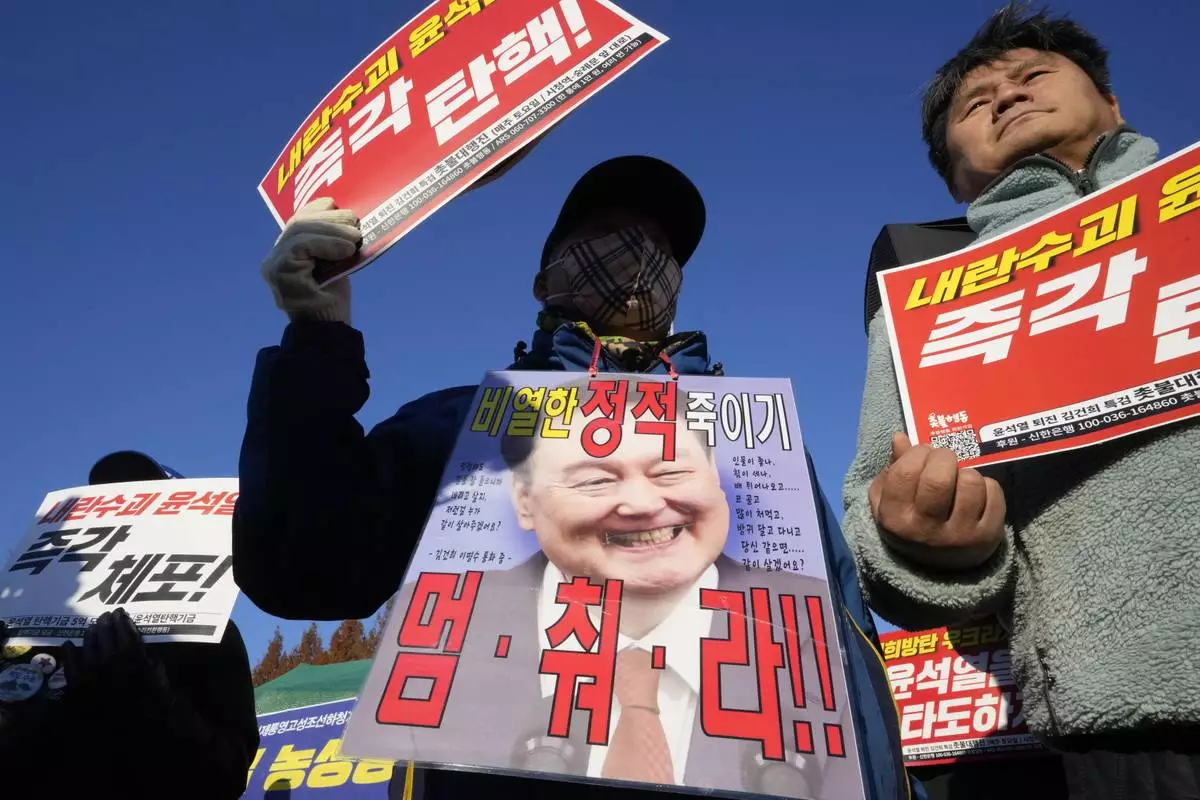
Protesters attend a rally to demand South Korean President Yoon Suk Yeol to step down in front of the National Assembly in Seoul, South Korea, Wednesday, Dec. 4, 2024. The signs read "Stop." (AP Photo/Ahn Young-joon)
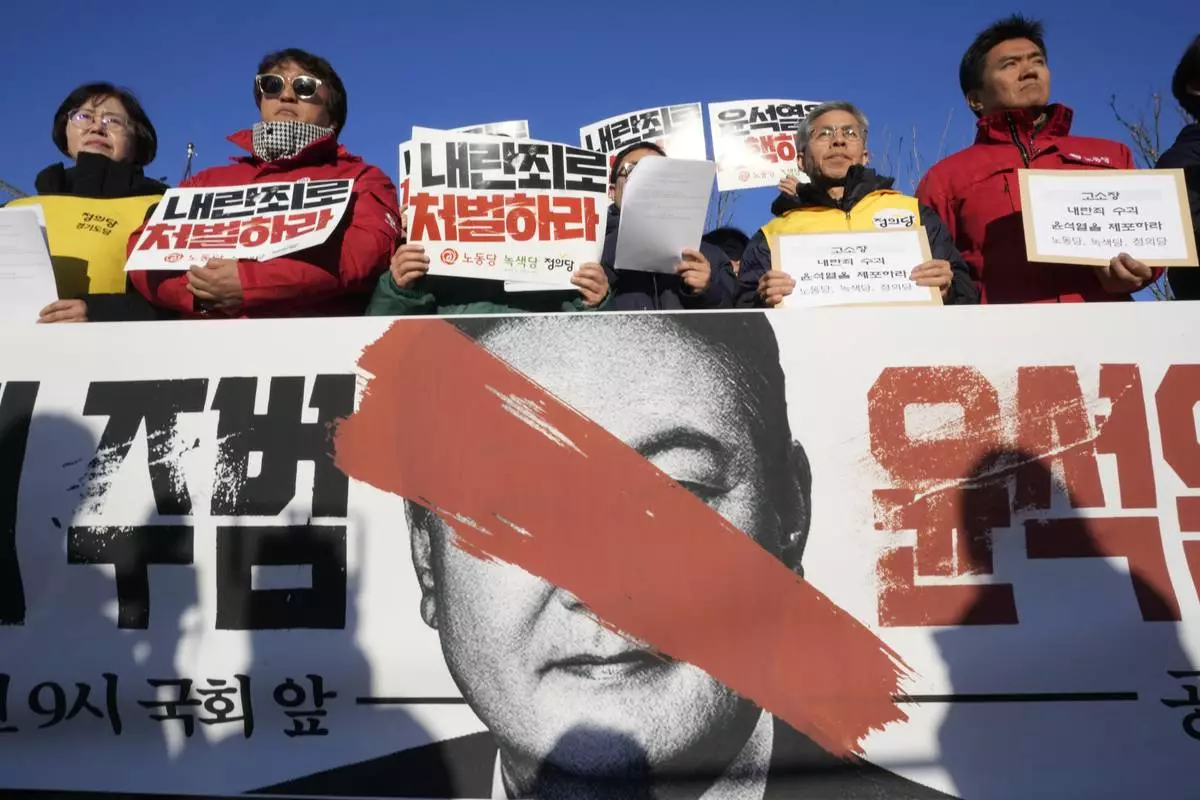
Protesters stage a rally to demand South Korean President Yoon Suk Yeol to step down in front of the National Assembly in Seoul, South Korea, Wednesday, Dec. 4, 2024. The signs read "Punish." (AP Photo/Ahn Young-joon)
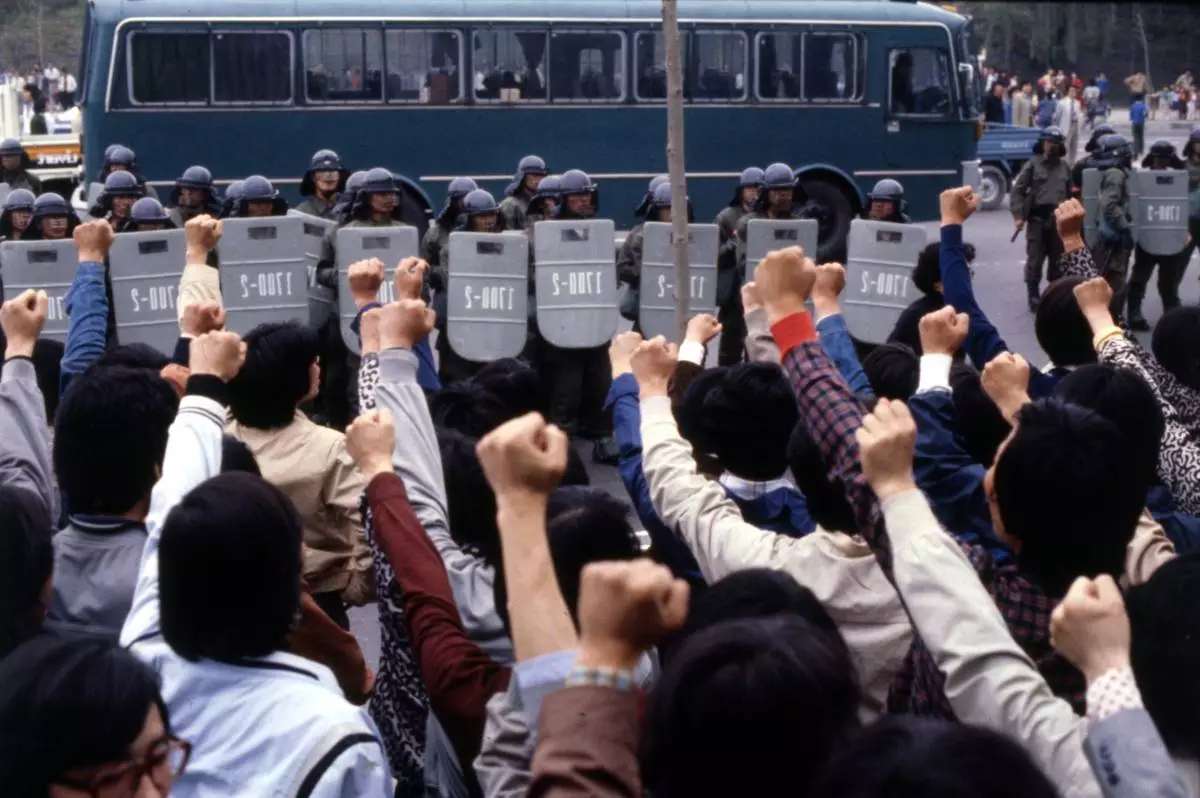
FILE - Mass students demonstrators demand the lifting of martial law and the resignation of Premier Shin Hyon-Hwack and Korean Central Intelligence chief Lt. Gen. Chun Doo-Hwan, in May 1980. (AP Photo, File)
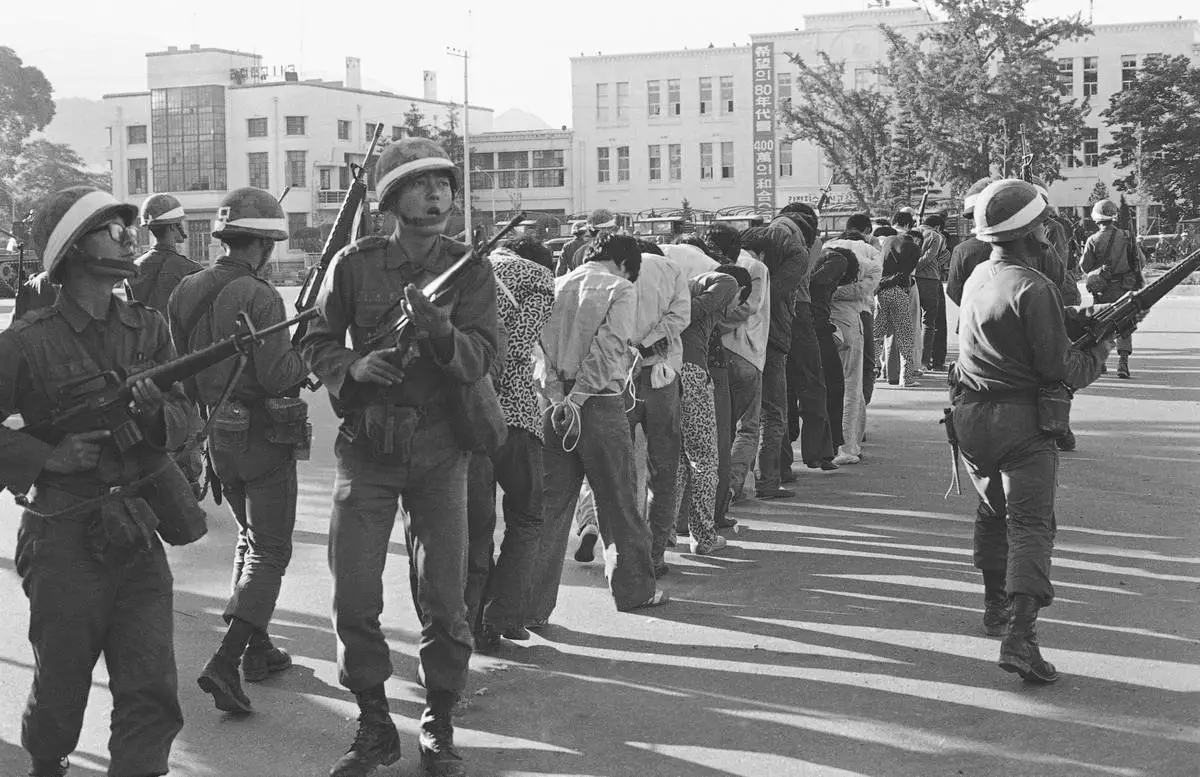
FILE - Armed South Korean government martial law troops guard captured rebels in Gwangju (Kwangju), South Korea, on May 27, 1980. The rebels were rounded up following the government's recapture by the riot-battered city. (AP Photo/Sadayuki Mikami, File)
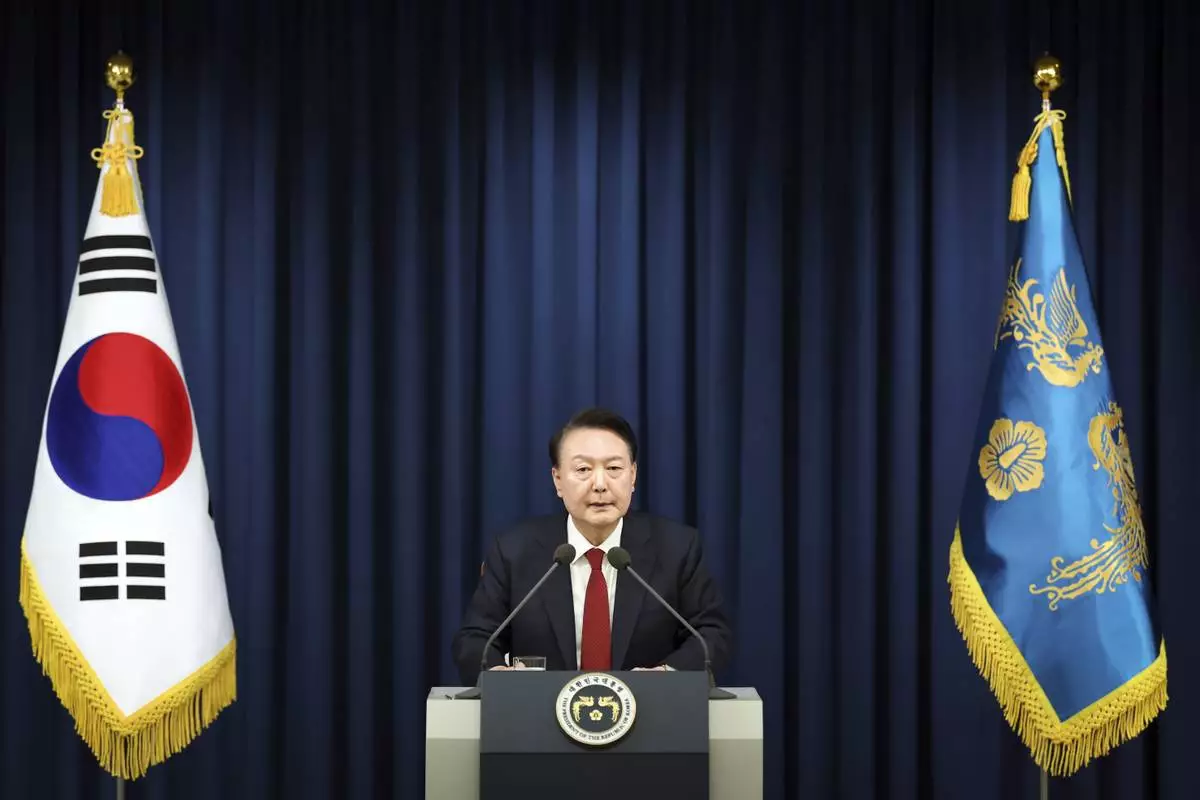
In this photo provided by South Korea Presidential Office, South Korean President Yoon Suk Yeol speaks during a press briefing at the presidential office in Seoul, South Korea, Tuesday, Dec. 3, 2024. (South Korea Unification Ministry via AP).
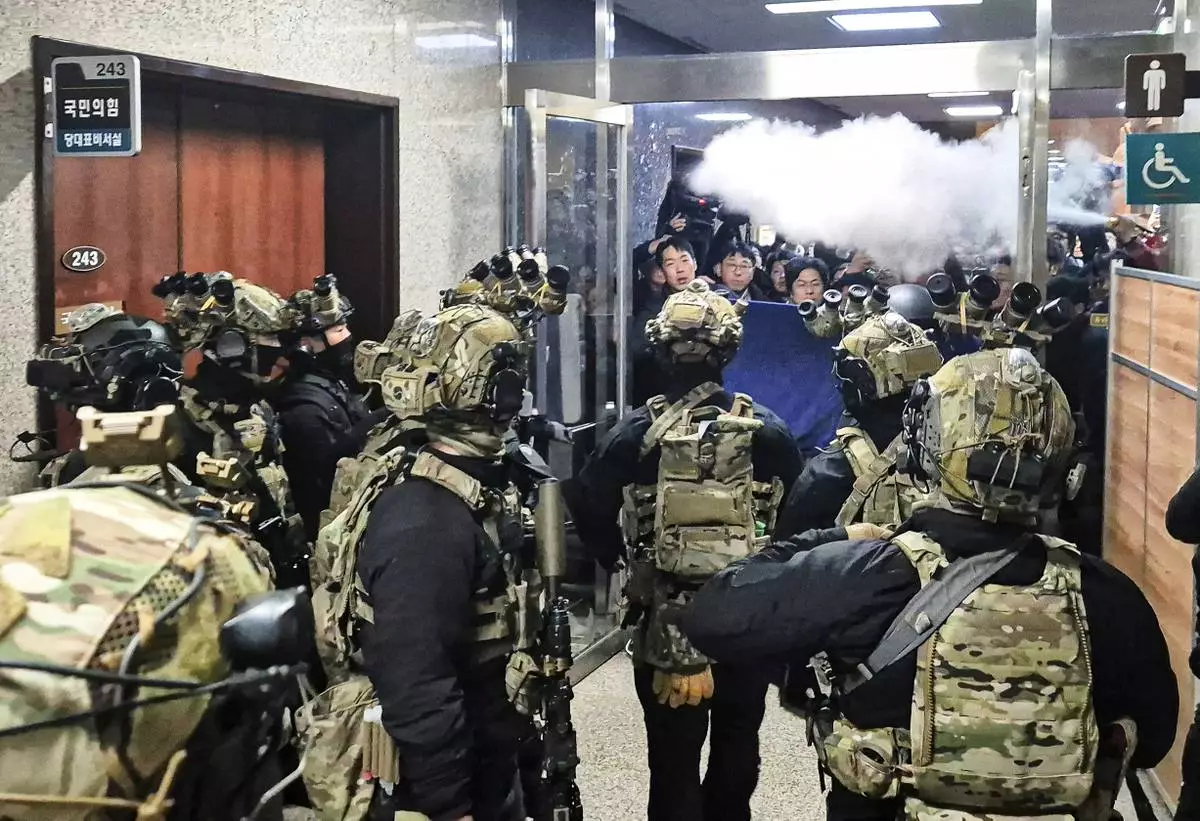
A National Assembly staff sprays fire extinguishers to block soldiers entering the main hall of the National Assembly in Seoul, South Korea, Wednesday, Dec. 4, 2024. (Jo Da-un/Yonhap via AP)
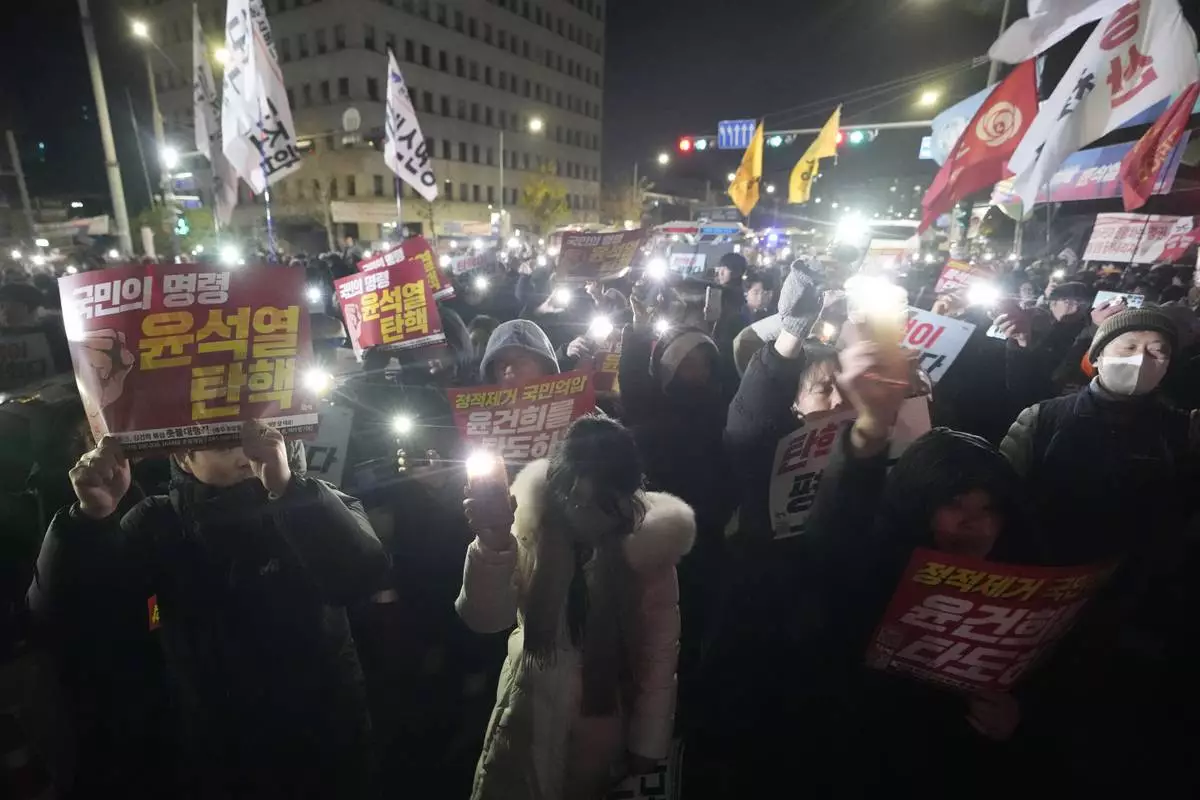
People gather to demand South Korean President Yoon Suk Yeol to step down in front of the National Assembly in Seoul, South Korea, Wednesday, Dec. 4, 2024. (AP Photo/Ahn Young-joon)
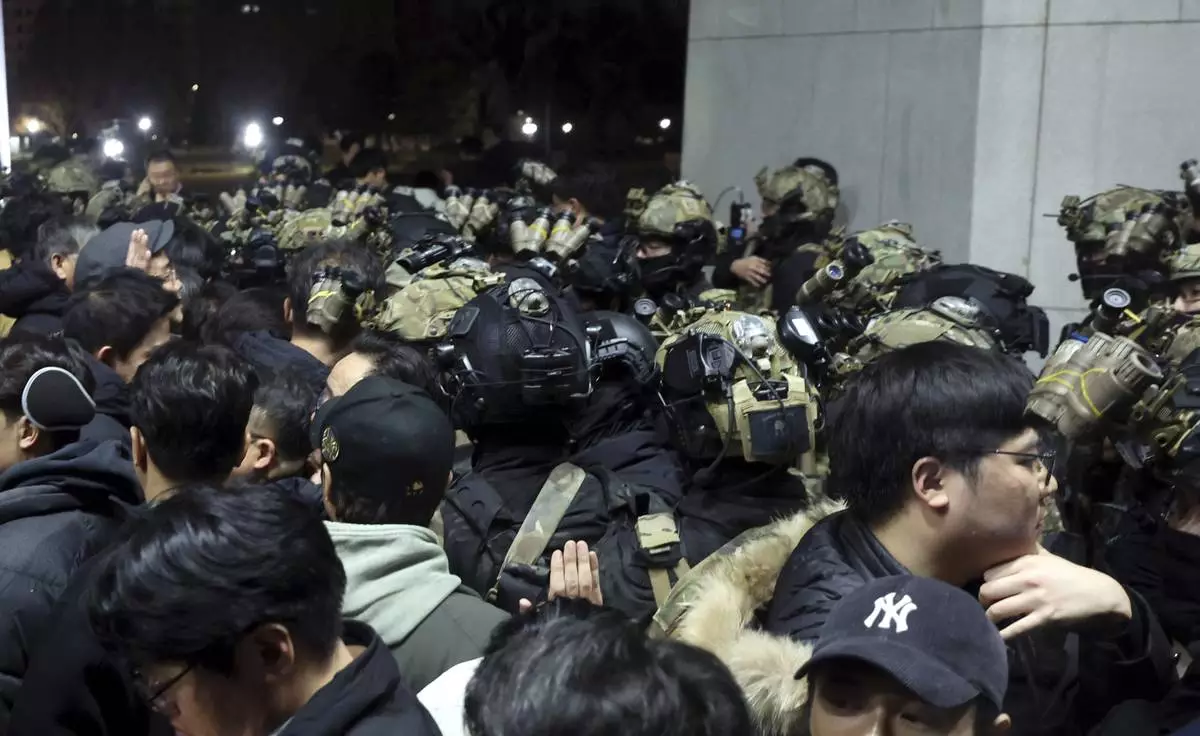
South Korean martial law soldiers try to enter the National Assembly compound in Seoul, South Korea, Wednesday, Dec. 4, 2024. (Cho Sung-bong/Newsis via AP)
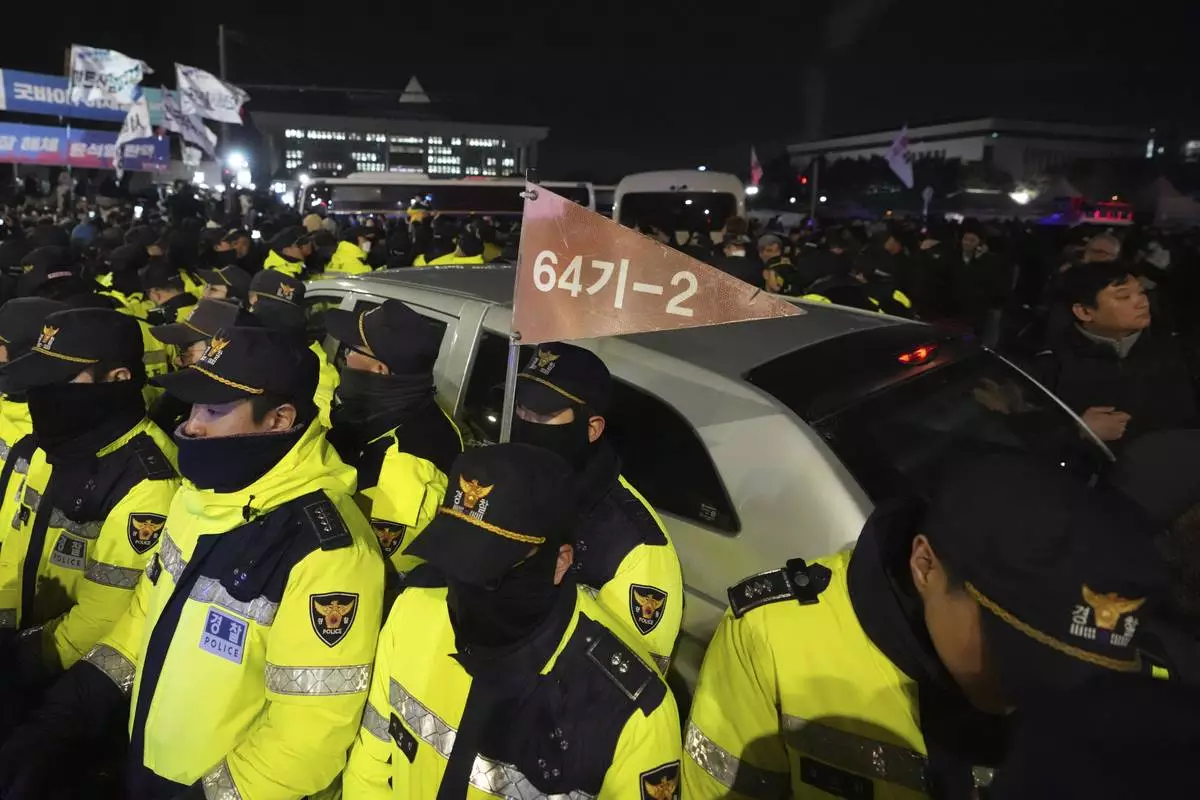
Police officers stand outside the National Assembly in Seoul, South Korea, Wednesday, Dec. 4, 2024. (AP Photo/Lee Jin-man)
SEOUL, South Korea (AP) — South Korea’s opposition parties Wednesday submitted a motion to impeach President Yoon Suk Yeol over the shocking and short-lived martial law that drew heavily armed troops to encircle parliament before lawmakers climbed walls to reenter the building and unanimously voted to lift his order.
Impeaching Yoon would require the support of two-thirds of parliament and at least six justices of the nine-member Constitutional Court would have to support it to remove him from office. The motion, submitted jointly by the main opposition Democratic Party and five smaller opposition parties, could be put to a vote as early as Friday.
Yoon’s senior advisers and secretaries offered to resign collectively and his Cabinet members, including Defense Minister Kim Yong Hyun, were also facing calls to step down, as the nation struggled to make sense of what appeared to be a poorly-thought-out stunt.
In his speech announcing the abrupt order Tuesday night, Yoon vowed to eliminate “anti-state” forces and continued to criticize parliament’s attempts to impeach key government officials and senior prosecutors. But martial law lasted only about six hours, as the National Assembly voted to overrule Yoon and the declaration was formally lifted around 4:30 a.m. during a Cabinet meeting.
The liberal opposition Democratic Party, which holds a majority in the 300-seat parliament, said Wednesday that its lawmakers decided to call on Yoon to quit immediately or they would take steps to impeach him.
“President Yoon Suk Yeol’s martial law declaration was a clear violation of the constitution. It didn’t abide by any requirements to declare it,” the Democratic Party said in a statement. “His martial law declaration was originally invalid and a grave violation of the constitution. It was a grave act of rebellion and provides perfect grounds for his impeachment.”
Impeaching him would require support from 200 of the National Assembly's 300 members. The Democratic Party and other small opposition parties together have 192 seats. But the rejection of Yoon’s martial law declaration in a 190-0 vote included the votes of 18 lawmakers from Yoon’s ruling People Power Party, according to National Assembly officials.
The leader of the People Power Party, Han Dong-hun, who has long ties with Yoon dating to their days as prosecutors, criticized Yoon’s martial law declaration as “unconstitutional.”
Seoul Mayor Oh Se-hoon, seen as a potential presidential hopeful for the People Power Party, said Yoon’s martial law declaration went against the “fundamental spirit of democracy” and that the deployment of troops to the National Assembly was an act that violated the separation of powers.
“Right now, the most urgent task is a thorough investigation. Through this, we must clearly hold accountable those who participated in destroying democracy,” Oh said in a televised statement.
If Yoon is impeached, he’ll be stripped of his constitutional powers until the Constitutional Court rules. Prime Minister Han Duck-soo, the No. 2 position in the South Korean government, would take over his presidential responsibilities. As calls mounted for Yoon’s Cabinet to resign, Han issued a public message pleading for patience and calling for Cabinet members to “fulfill your duties even after this moment.”
The Constitutional Court has only six justices following three retirements, which is one below the minimum seven needed to handle a presidential impeachment case, requiring lawmakers to speed up the process of naming new justices.
Yoon’s martial law declaration, the first of its kind in more than 40 years, harkened to South Korea’s past military-backed governments when authorities occasionally proclaimed martial law and other decrees that allowed them to station combat soldiers, tanks and armored vehicles on streets or at public places like schools to prevent anti-government demonstrations. Such scenes of military intervention had not been seen since South Korea achieved a genuine democracy in the late 1980s until Tuesday night.
After Yoon’s declaration, troops carrying full battle gear, including assault rifles, tried to keep protesters away from the National Assembly as military helicopters flew overhead and landed nearby. One soldier pointed his assault rifle at a woman who was among protesters outside the building demanding that the martial law be lifted.
It wasn’t clear how the 190 lawmakers were able to enter a parliamentary hall to vote down Yoon’s martial law decree. Opposition leader Lee Jae-myung livestreamed himself climbing over the wall, and while troops and police officers blocked some from entering they didn’t aggressively restrain or use force against others.
No major violence has been reported. The troops and police personnel were later seen leaving the grounds of the National Assembly after the parliamentary vote to lift the martial law. National Assembly Speaker Woo Won Shik said: “Even with our unfortunate memories of military coups, our citizens have surely observed the events of today and saw the maturity of our military.”
Han, the People Power Party leader, demanded that Yoon explain his decision and fire Defense Minister Kim Yong Hyun, who he said recommended the martial law decree to Yoon. The Defense Ministry has not commented.
Under South Korea’s constitution, the president can declare martial law during “wartime, war-like situations or other comparable national emergency states” that require the use of military force to restrict the freedom of press, assembly and other rights to maintain order. Many observers question whether South Korea is currently in such a state.
The constitution also states that the president must oblige when the National Assembly demands the lifting of martial law with a majority vote.
Some experts say Yoon clearly violated the constitution in how he imposed martial law. While martial law allows “special measures” to restrict individual freedoms and the authority of agencies and courts, the constitution does not permit the functions of parliament to be restricted. But in following Yoon’s declaration on Tuesday, South Korea’s military proclaimed parliamentary activities were suspended and deployed troops to try to block lawmakers from entering the National Assembly.
Park Chan-dae, the Democratic Party’s floor leader, called for Yoon to be immediately investigated on charges of rebellion over the way he deployed troops to the parliament. While the president mostly enjoys immunity from prosecution while in office, the protection does not extend to alleged rebellion or treason.
In Washington, the White House said the U.S. was “seriously concerned” by the events in Seoul. A spokesperson for the National Security Council said President Joe Biden’s administration was not notified in advance of the martial law announcement and was in contact with the South Korean government.
Pentagon spokesman Maj. Gen. Pat Ryder said there was no effect on the more than 27,000 U.S. service members based in South Korea.
In Seoul, the streets seemed busy like a normal day Wednesday.
Tourist Stephen Rowan, from Brisbane, Australia, who was touring Gyeongbokgung Palace, said he was not concerned at all.
“But then again, I don’t understand too much about the political status in Korea,” he said. “But I hear they are now calling for the current president’s resignation, so ... apparently there’s going to be a lot of demonstrations. ... I would have been concerned if martial law had stayed enforced.”
Yoon’s government and ruling party have been embroiled in an impasse with the Democratic Party over next year’s budget bill and a Democratic Party-led attempt to impeach three top prosecutors.
Natalia Slavney, research analyst at the Stimson Center’s 38 North website that focuses on Korean affairs, said Yoon’s imposition of martial law was “a serious backslide of democracy” that followed a “worrying trend of abuse” since he took office in 2022.
South Korea “has a robust history of political pluralism and is no stranger to mass protests and swift impeachments,” Slavney said, citing the example of former President Park Geun-hye, who was removed from office and imprisoned for bribery and other crimes in 2017. She was later pardoned.
Associated Press writer Jennifer McDermott contributed to this report.
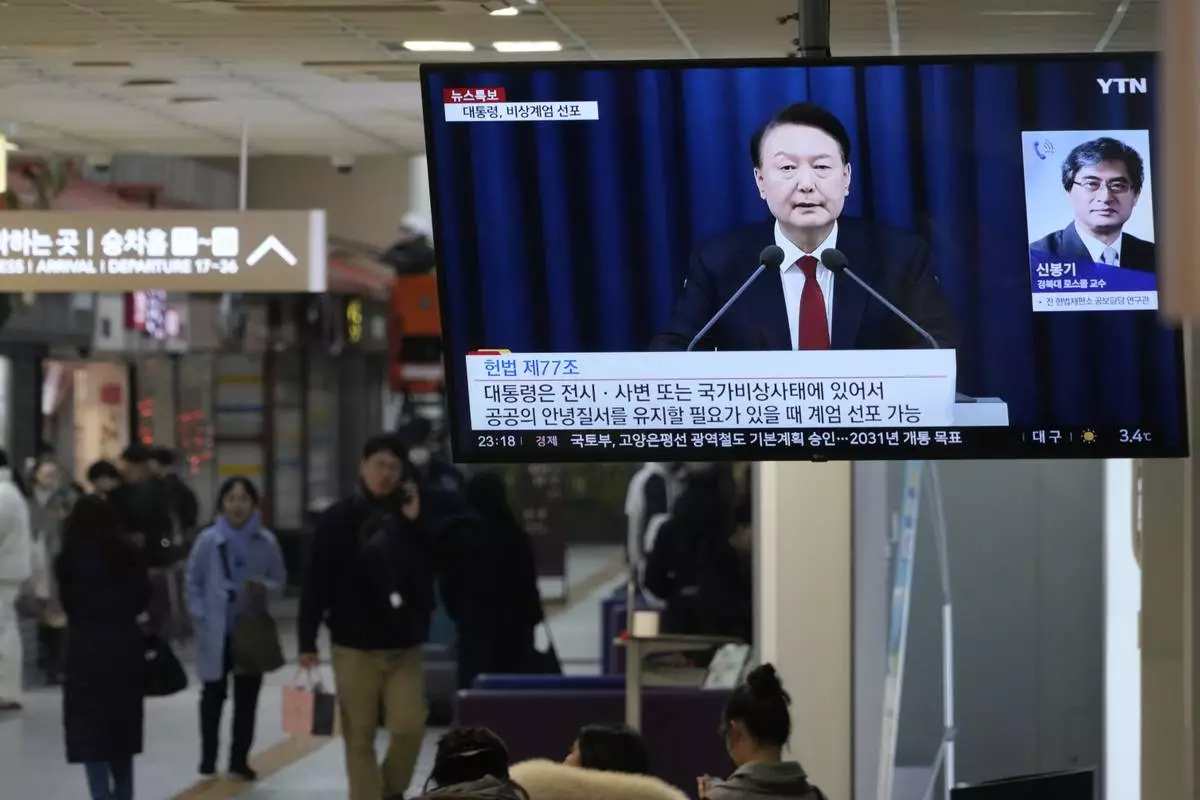
A TV screen shows South Korean President Yoon Suk Yeol's televised briefing at a bus terminal in Seoul, South Korea, Tuesday, Dec. 3, 2024. (AP Photo/Ahn Young-joon)
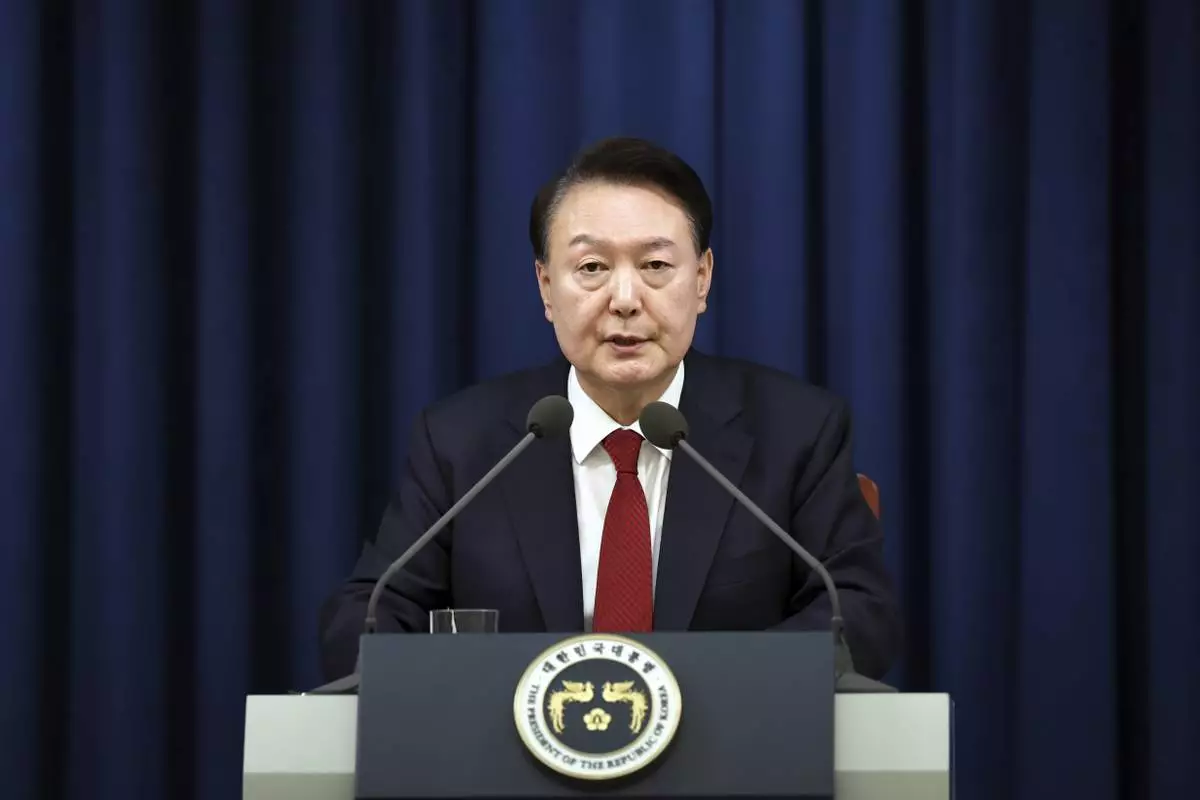
In this photo provided by South Korea Presidential Office, South Korean President Yoon Suk Yeol speaks during a press briefing at the presidential office in Seoul, South Korea, Tuesday, Dec. 3, 2024. (South Korea Unification Ministry via AP).
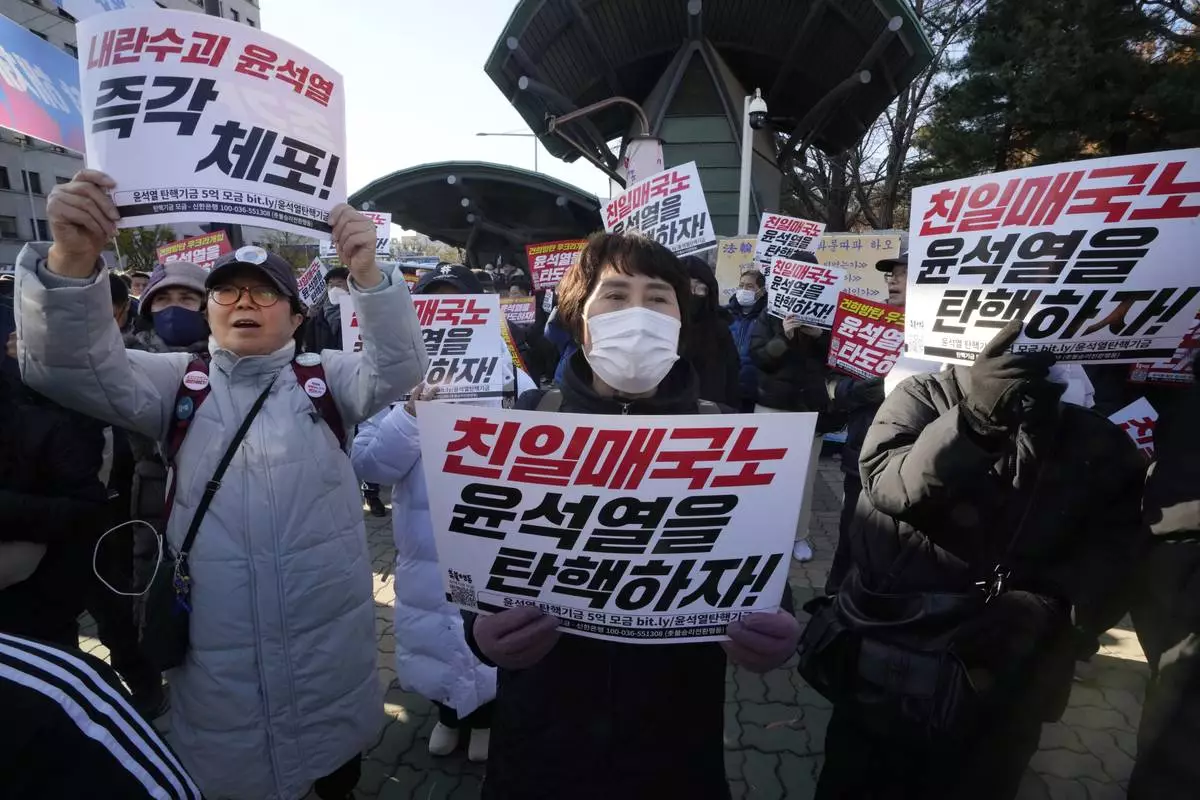
Members of main opposition Democratic Party stage a rally against South Korean President Yoon Suk Yeol in front of the National Assembly in Seoul, South Korea, Wednesday, Dec. 4, 2024. The signs read "Let's impeach Yoon Suk Yeol ." (AP Photo/Ahn Young-joon)
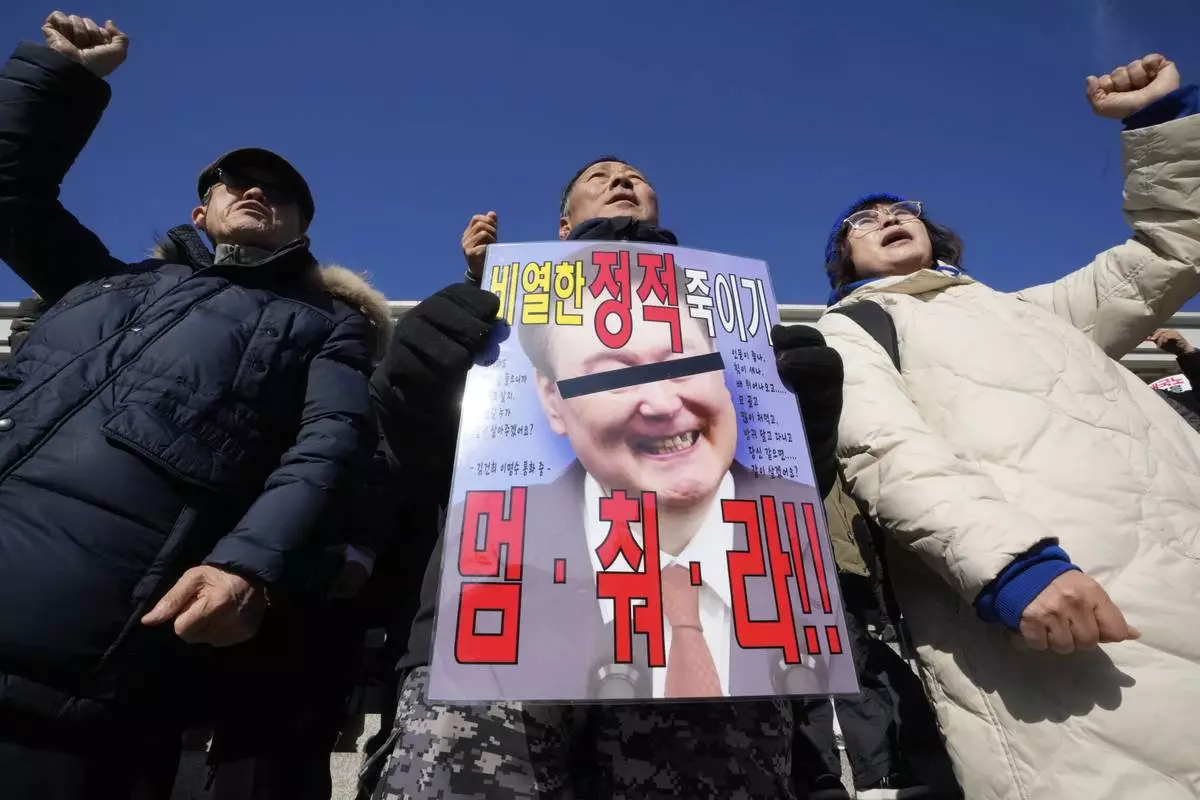
Members of main opposition Democratic Party shout slogans during a rally against South Korean President Yoon Suk Yeol at the National Assembly in Seoul, South Korea, Wednesday, Dec. 4, 2024. The signs read "Stop." (AP Photo/Ahn Young-joon)
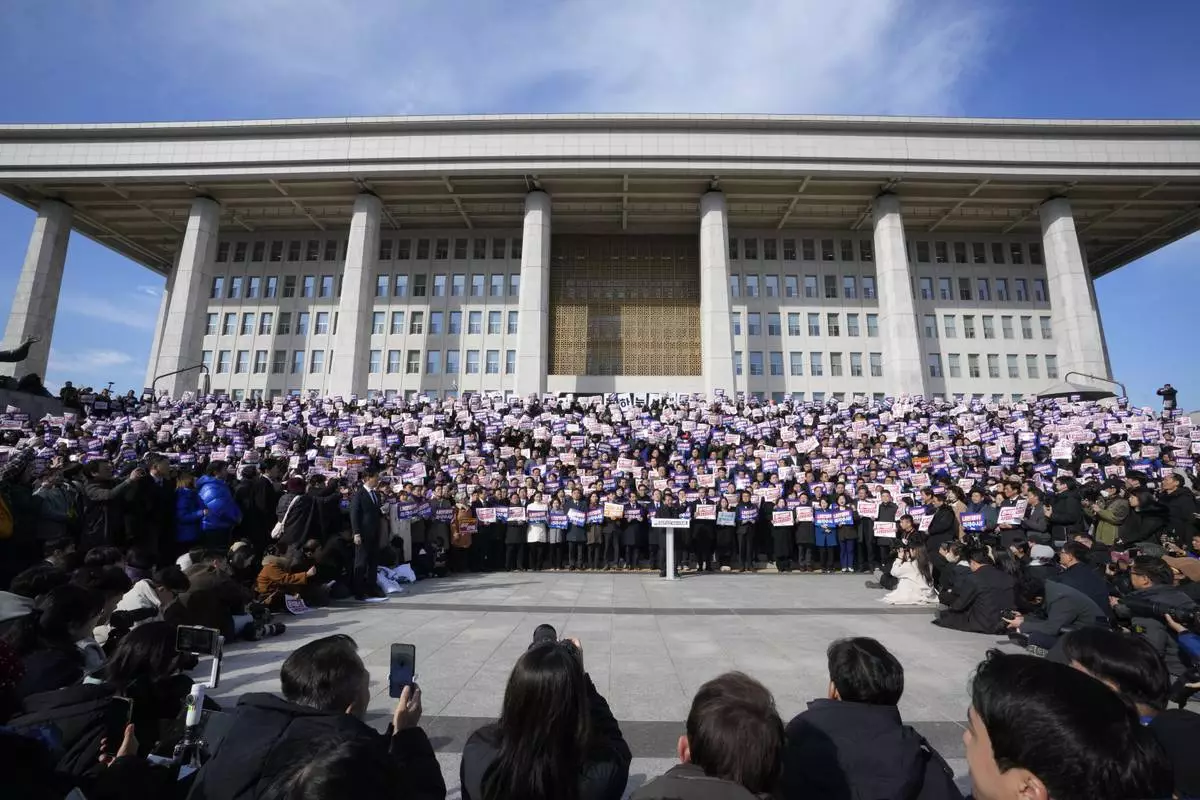
Members of main opposition Democratic Party stage a rally against South Korean President Yoon Suk Yeol at the National Assembly in Seoul, South Korea, Wednesday, Dec. 4, 2024. (AP Photo/Ahn Young-joon)
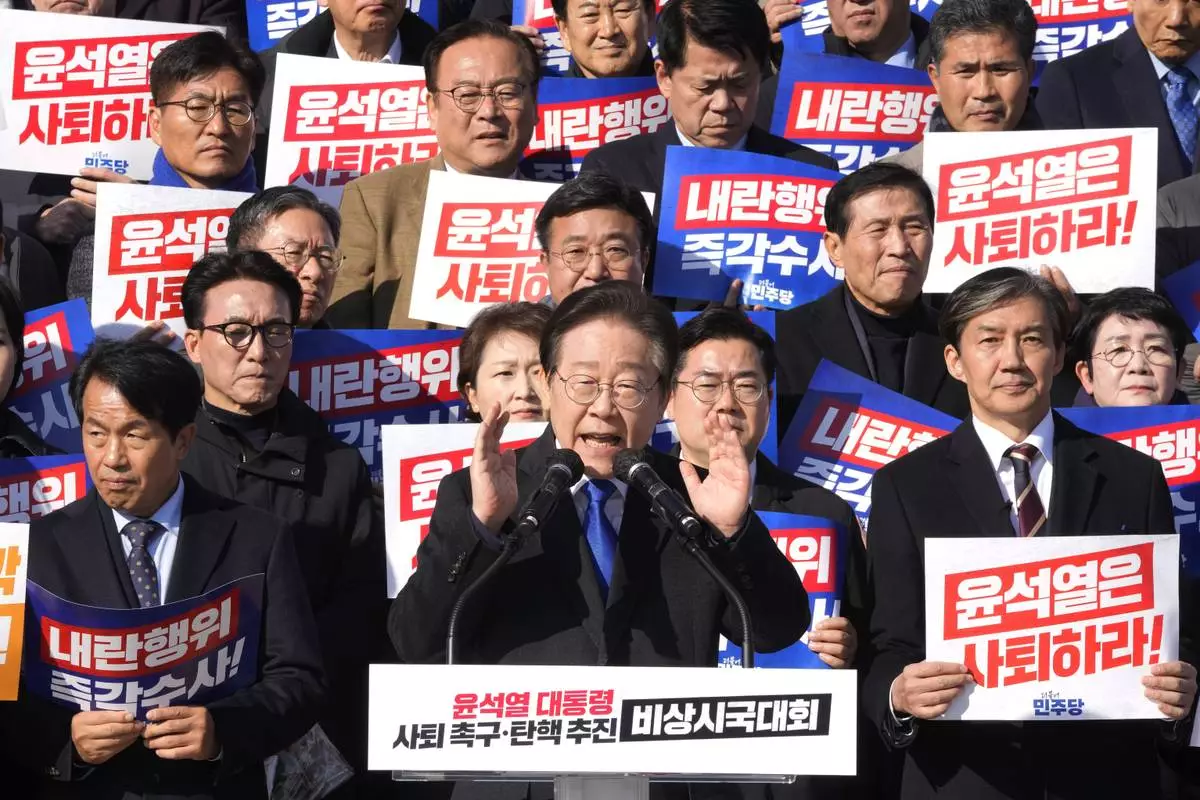
South Korea's main opposition Democratic Party leader Lee Jae-myung, bottom center, speaks during a rally against President Yoon Suk Yeol at the National Assembly in Seoul, South Korea, Wednesday, Dec. 4, 2024. The signs read "Yoon Suk Yeol should resign." (AP Photo/Ahn Young-joon)
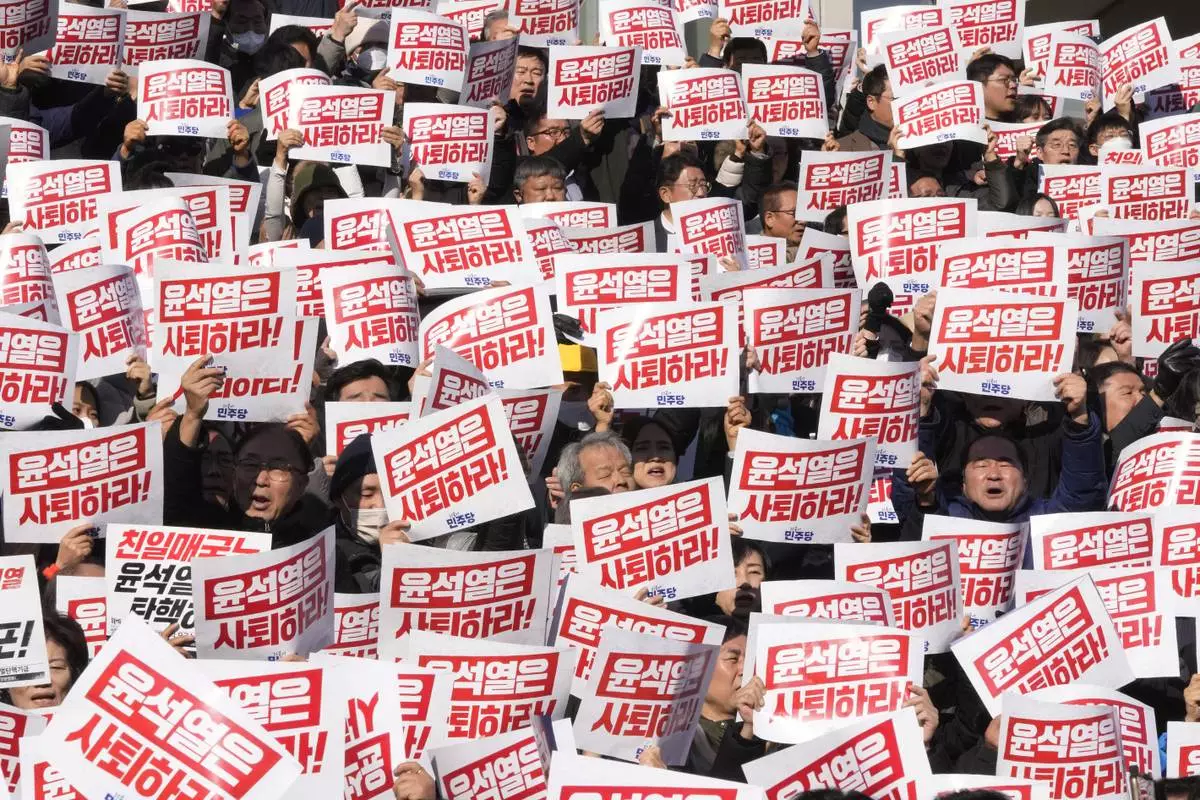
Members of main opposition Democratic Party stage a rally against South Korean President Yoon Suk Yeol at the National Assembly in Seoul, South Korea, Wednesday, Dec. 4, 2024. The signs read "Yoon Suk Yeol should resign." (AP Photo/Ahn Young-joon)
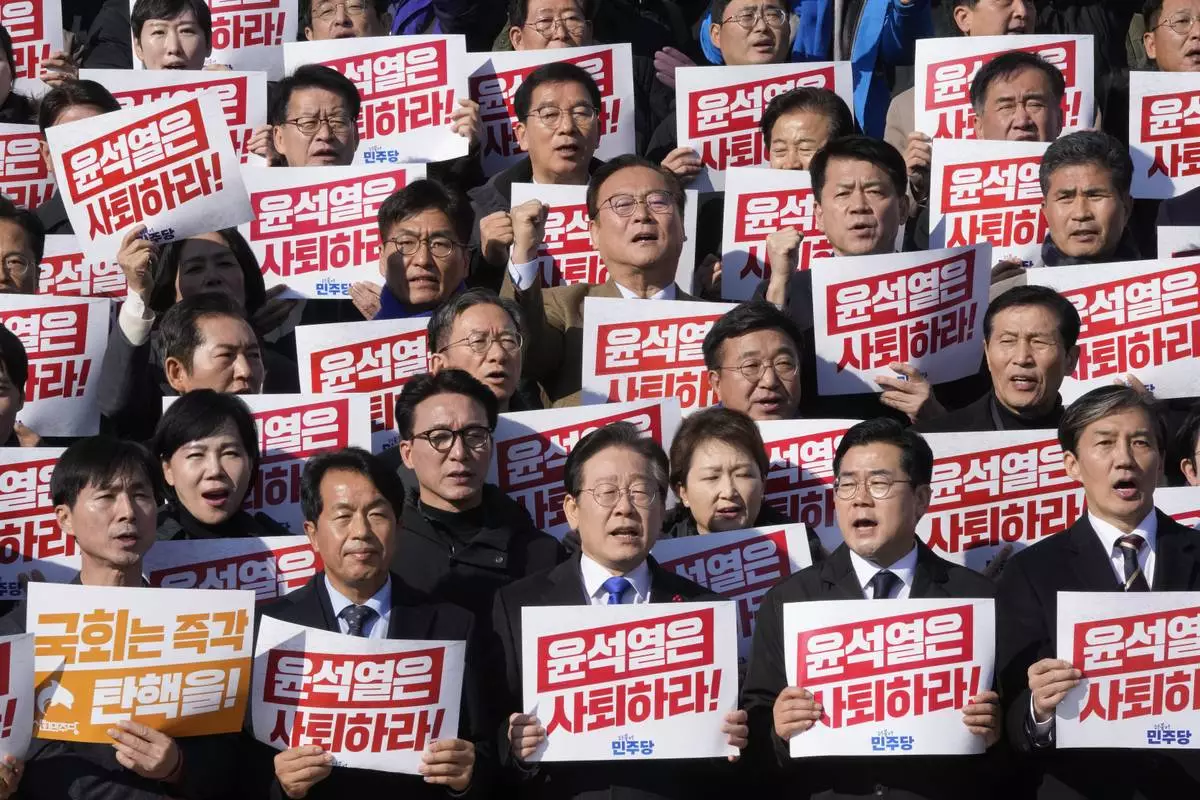
South Korea's main opposition Democratic Party leader Lee Jae-myung, bottom center, shout slogans during a rally against President Yoon Suk Yeol at the National Assembly in Seoul, South Korea, Wednesday, Dec. 4, 2024. The signs read "Yoon Suk Yeol should resign." (AP Photo/Ahn Young-joon)
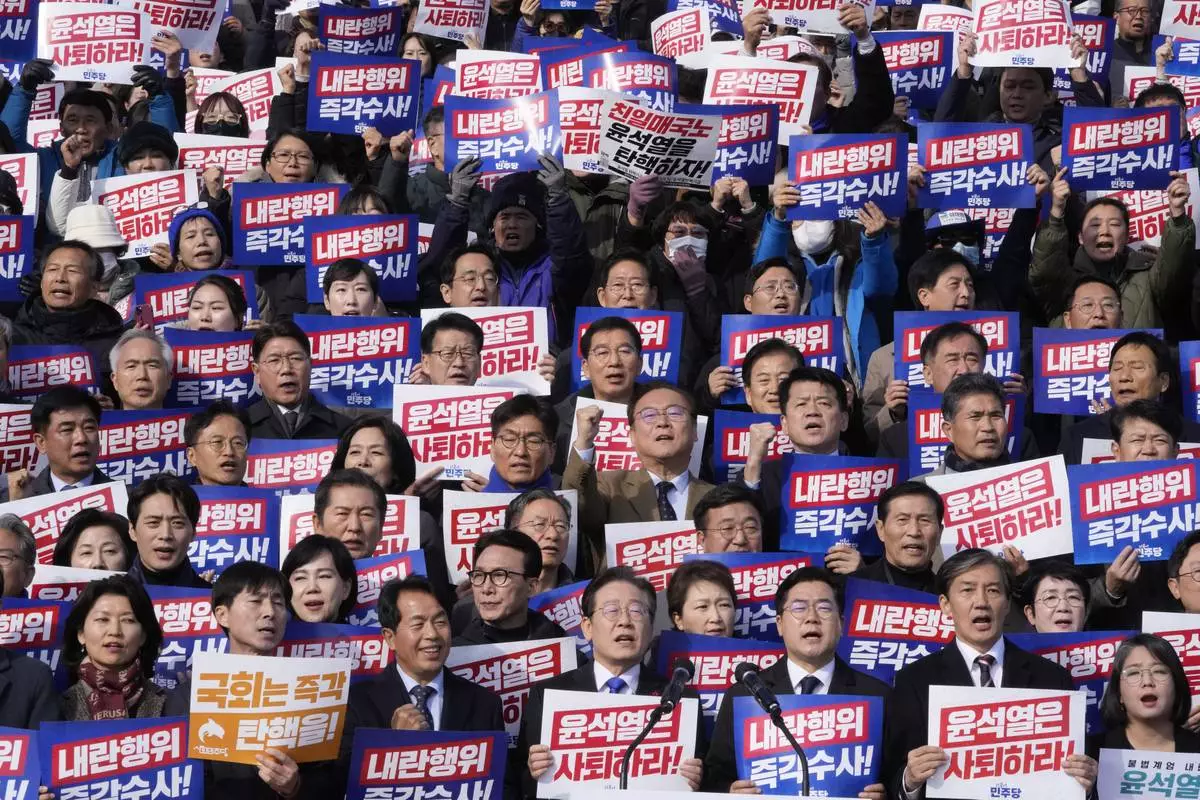
South Korea's main opposition Democratic Party leader Lee Jae-myung, bottom center, shout slogans during a rally against President Yoon Suk Yeol at the National Assembly in Seoul, South Korea, Wednesday, Dec. 4, 2024. The signs read "Yoon Suk Yeol should resign." (AP Photo/Ahn Young-joon)
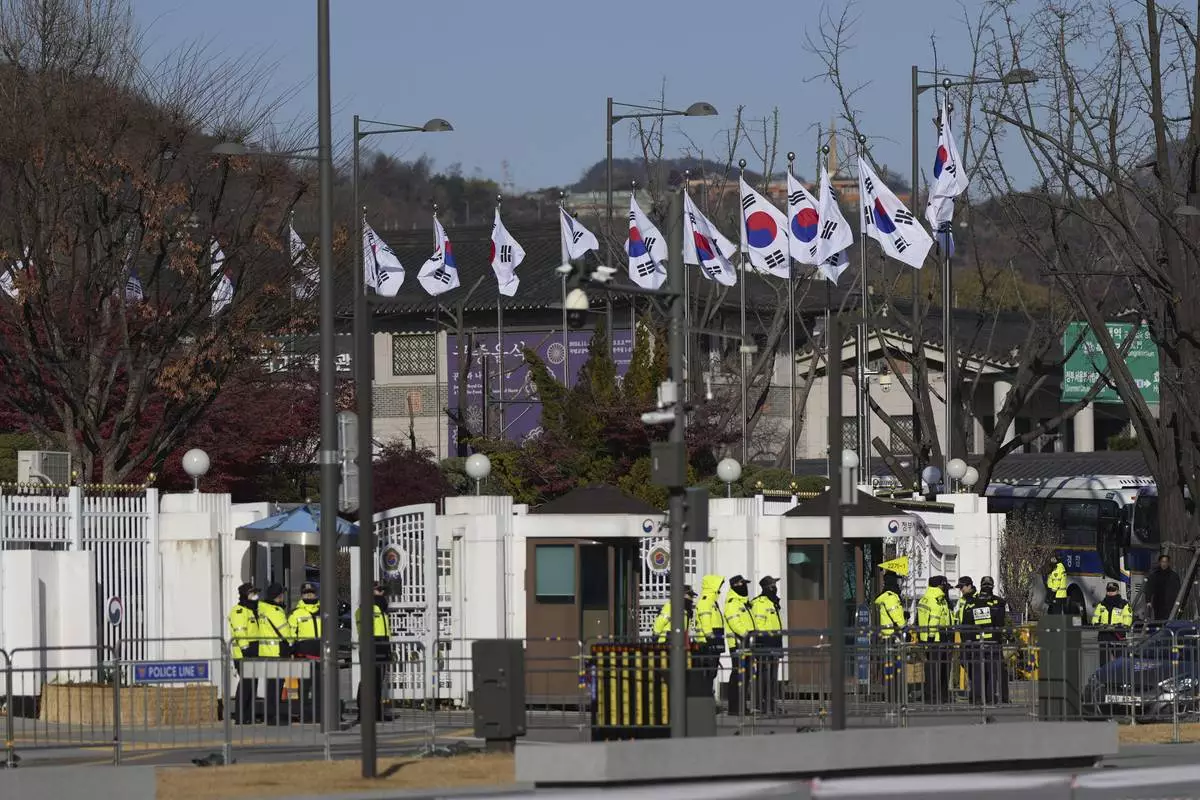
South Korean police officers stand guard in front of the government complex in Seoul, South Korea, Wednesday, Dec. 4, 2024. (AP Photo/Lee Jin-man)
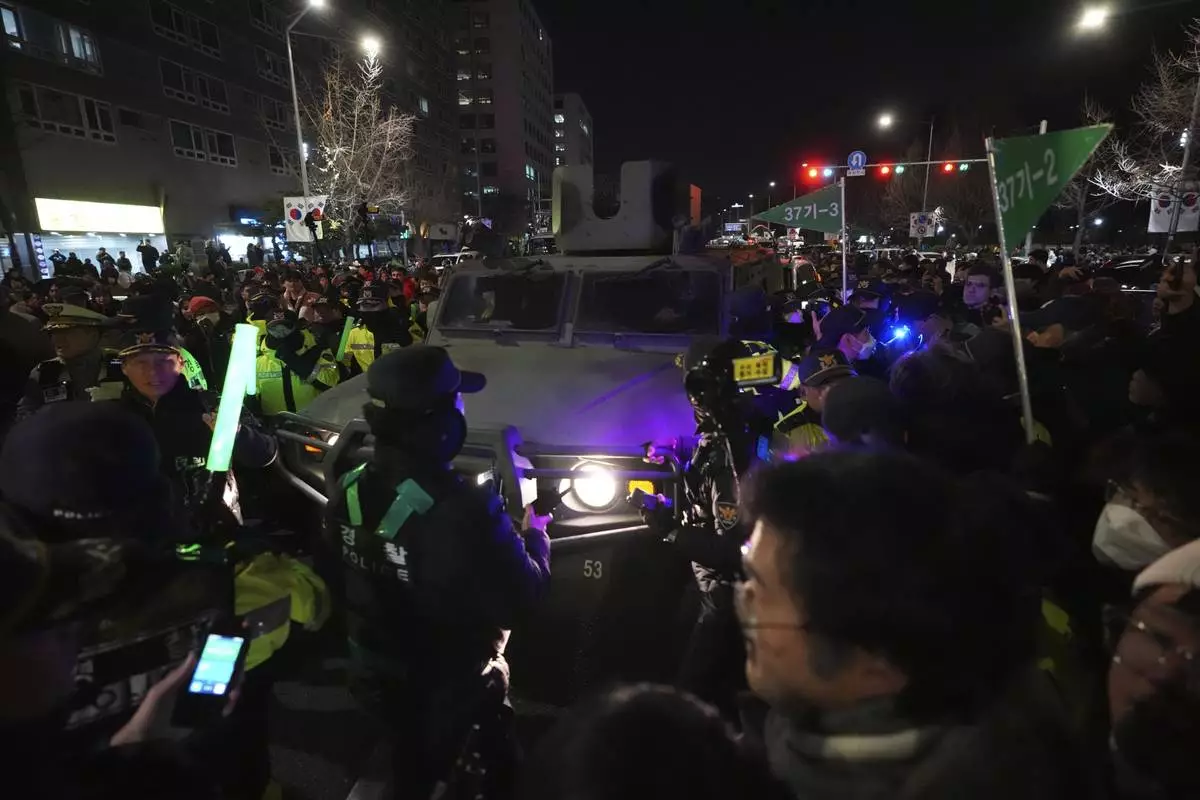
Military vehicle is escorted by police officers as people try to block outside of the National Assembly in Seoul, South Korea, Wednesday, Dec. 4, 2024. (AP Photo/Lee Jin-man)
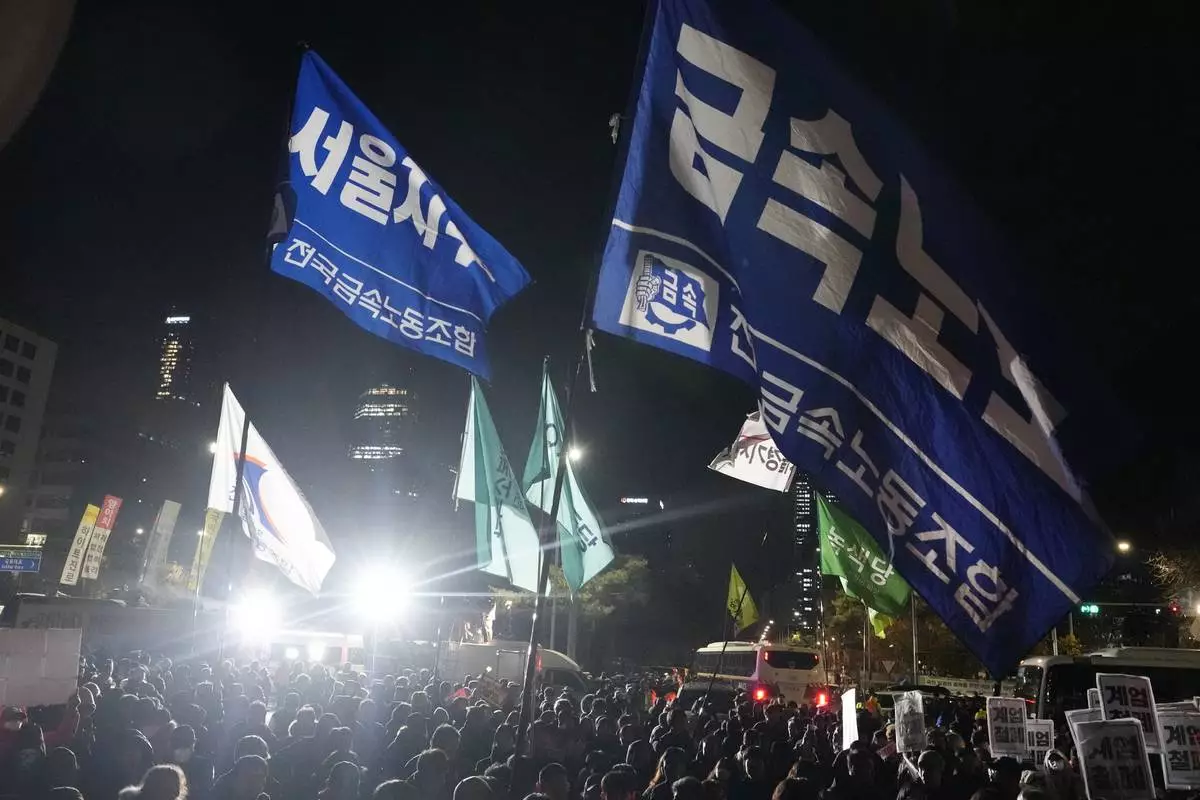
People gather to demand South Korean President Yoon Suk Yeol to step down in front of the National Assembly in Seoul, South Korea, Wednesday, Dec. 4, 2024. (AP Photo/Ahn Young-joon)
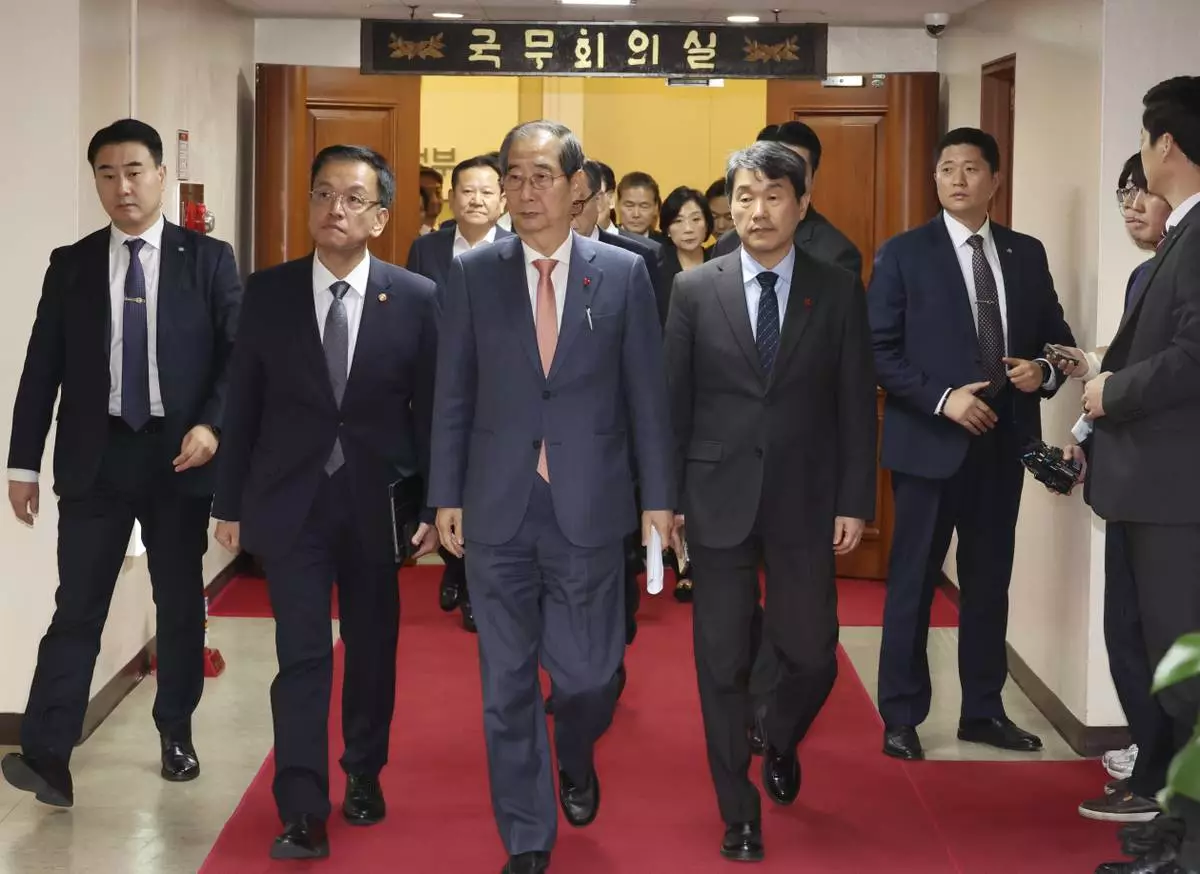
South Korean Prime Minister Han Duck-soo, center, and other ministers leave after a meeting at the government complex in Seoul, South Korea, Wednesday, Dec. 4, 2024. (Choi Jae-gu/Yonhap via AP)
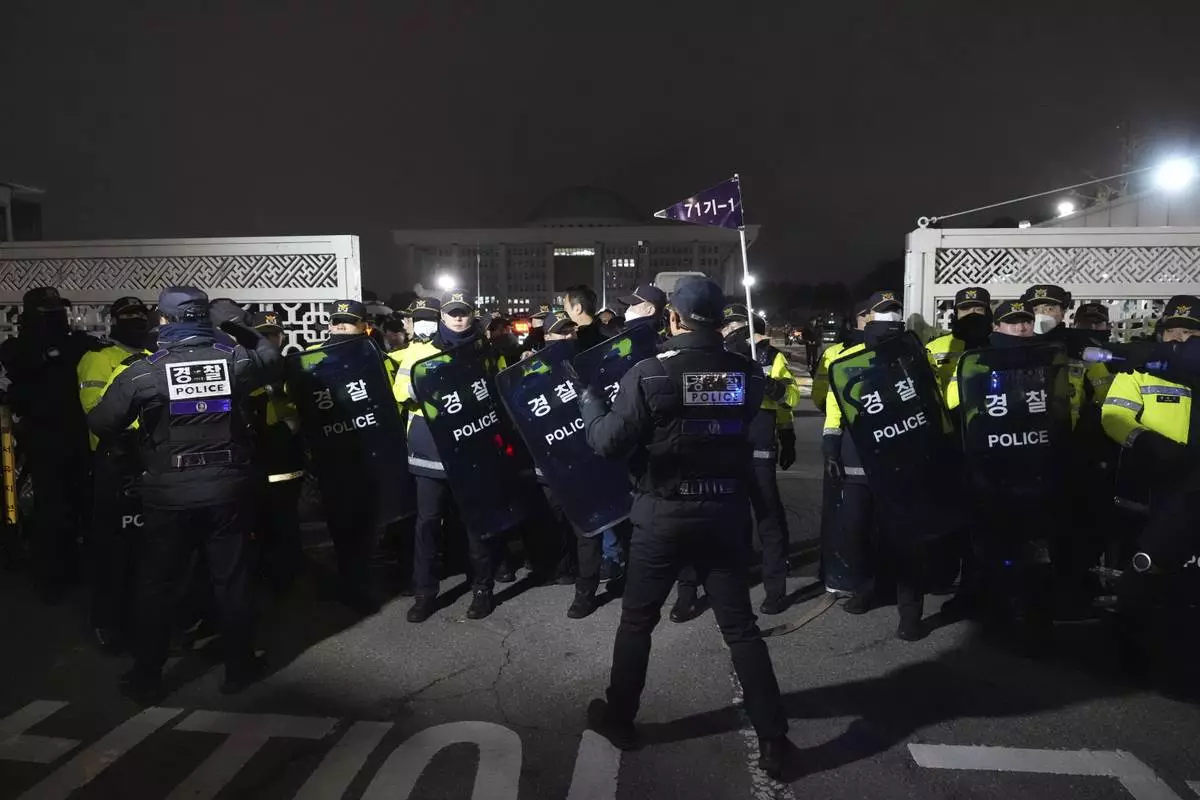
Police officers stand guard in front of the National Assembly in Seoul, South Korea, Tuesday, Dec. 3, 2024. (AP Photo/Lee Jin-man)
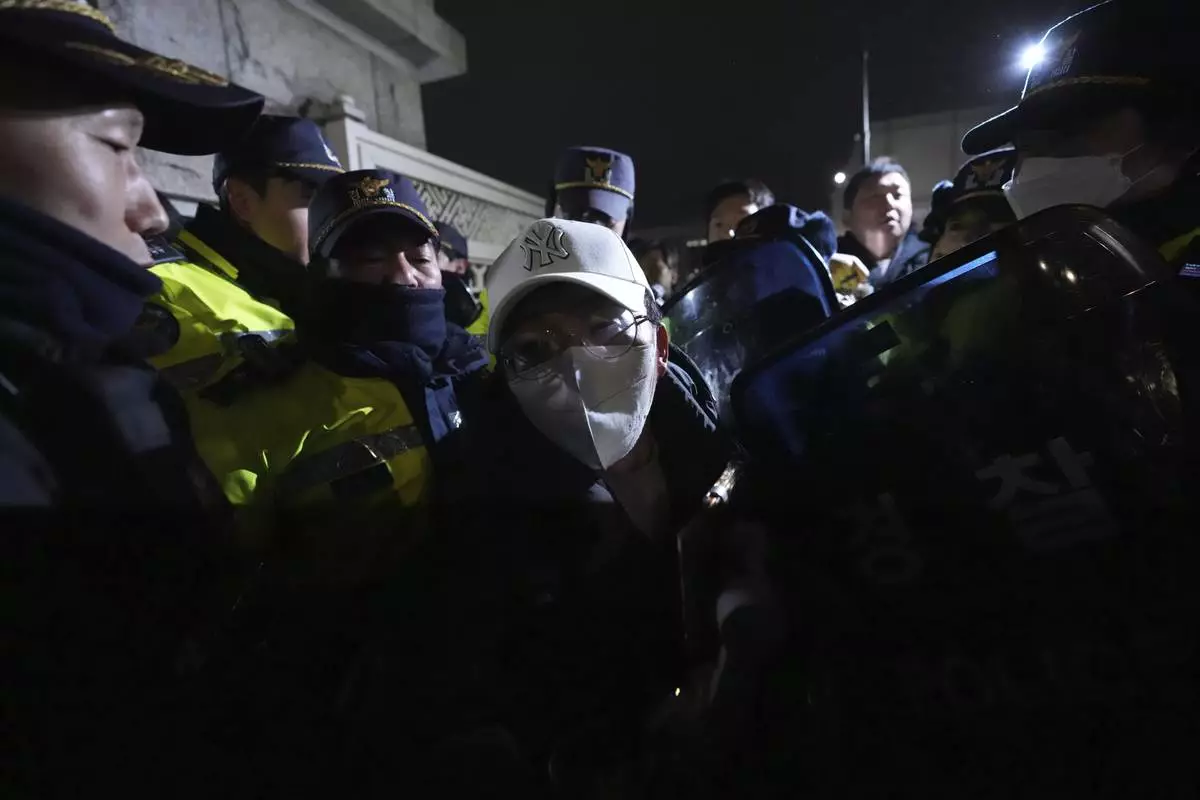
People try to enter as police officers stand guard in front of the National Assembly in Seoul, South Korea, Tuesday, Dec. 3, 2024. (AP Photo/Lee Jin-man)
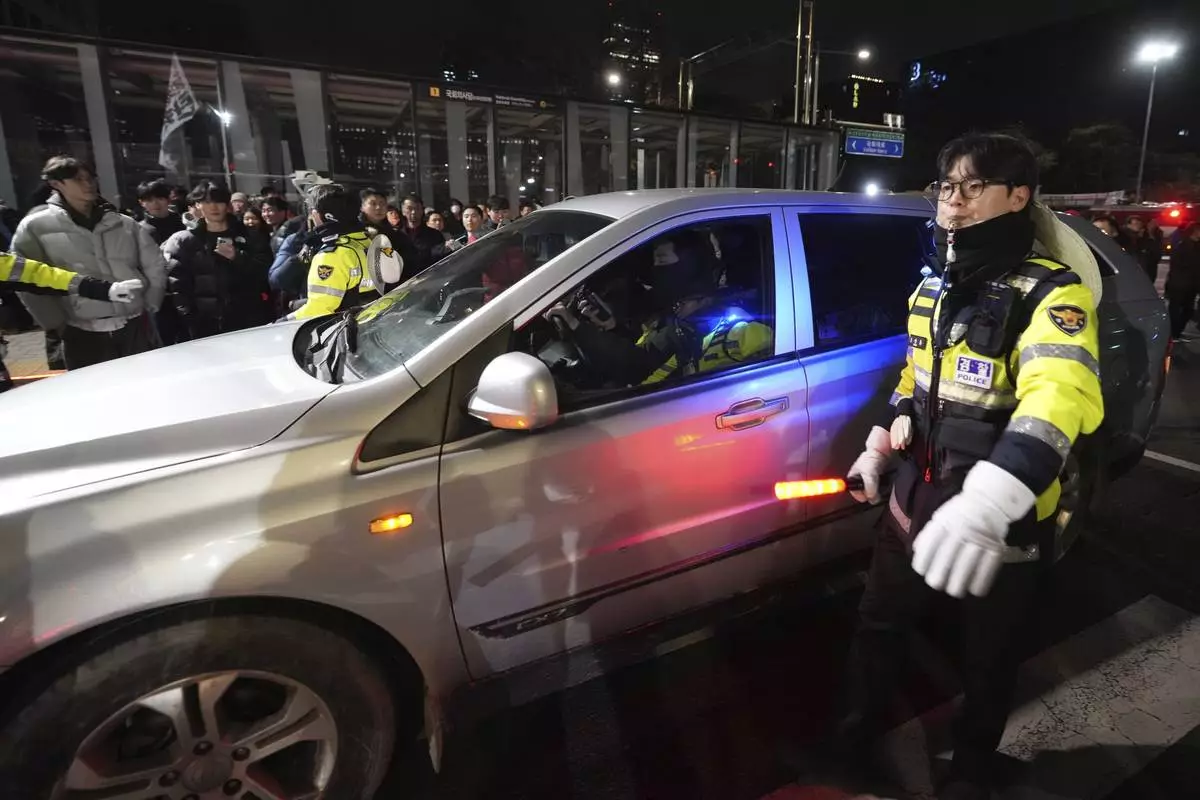
Military vehicles is escorted by police officers outside of the National Assembly in Seoul, South Korea, Wednesday, Dec. 4, 2024. (AP Photo/Lee Jin-man)
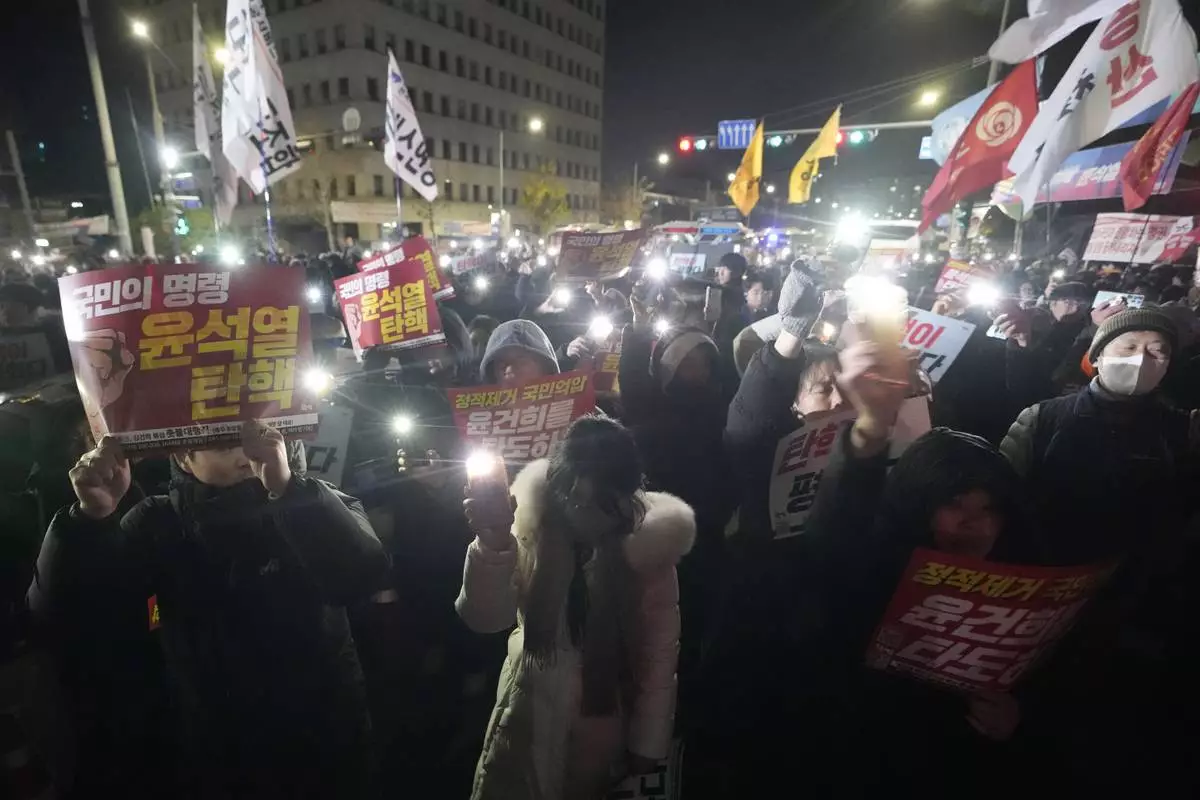
People gather to demand South Korean President Yoon Suk Yeol to step down in front of the National Assembly in Seoul, South Korea, Wednesday, Dec. 4, 2024. (AP Photo/Ahn Young-joon)
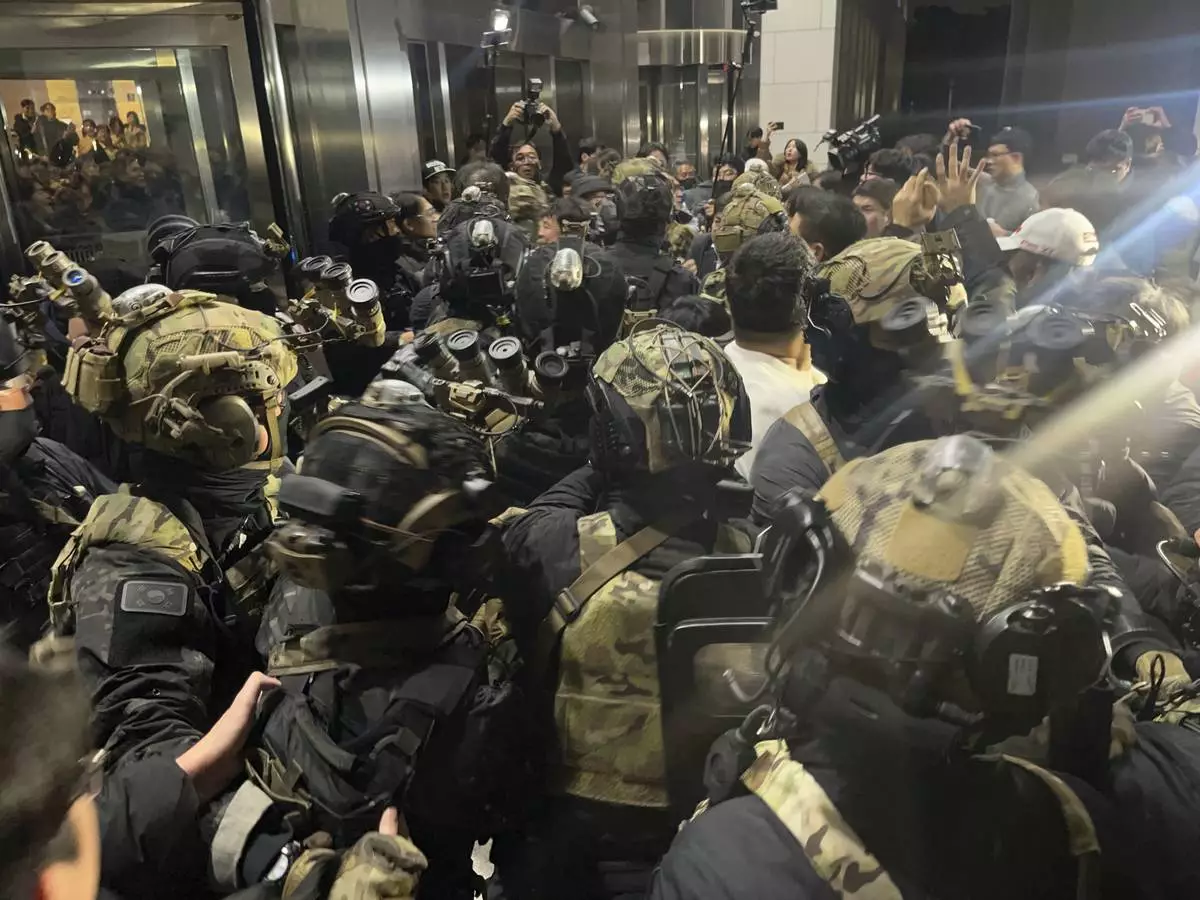
South Korean martial law soldiers try to enter the National Assembly compound in Seoul, South Korea, Wednesday, Dec. 4, 2024. (Cho Jung-woo/Newsis via AP)
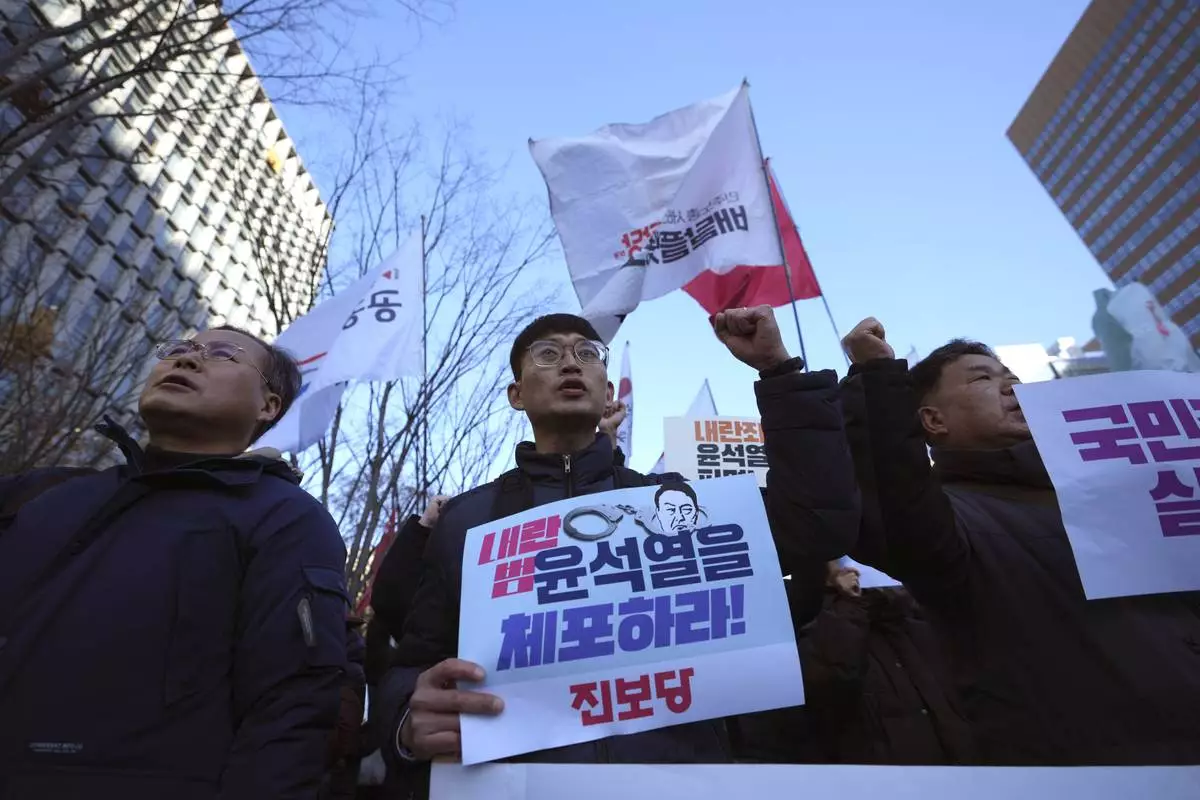
South Koreans shout slogans with signs reading "Arrest Yoon Suk Yeol" during a rally in Seoul, South Korea, Wednesday, Dec. 4, 2024. (AP Photo/Lee Jin-man)
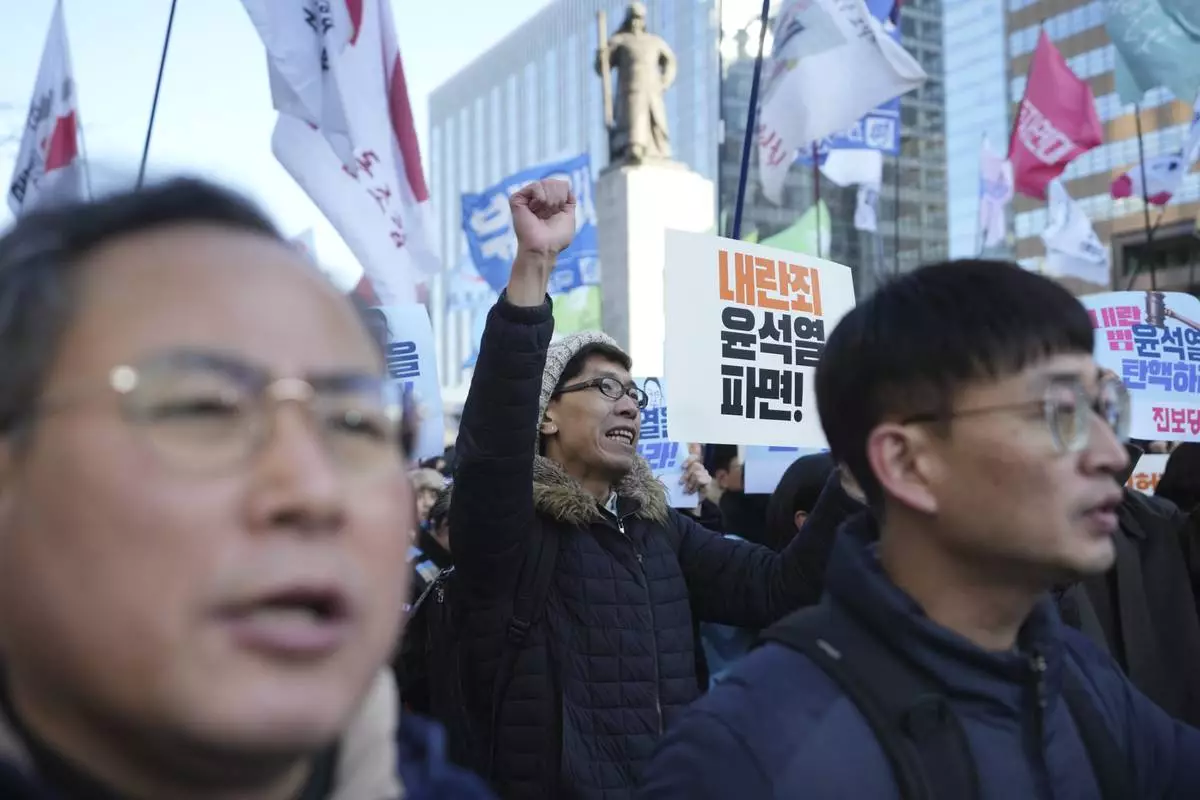
South Koreans shout slogans during a rally in Seoul, South Korea, Wednesday, Dec. 4, 2024. (AP Photo/Lee Jin-man)
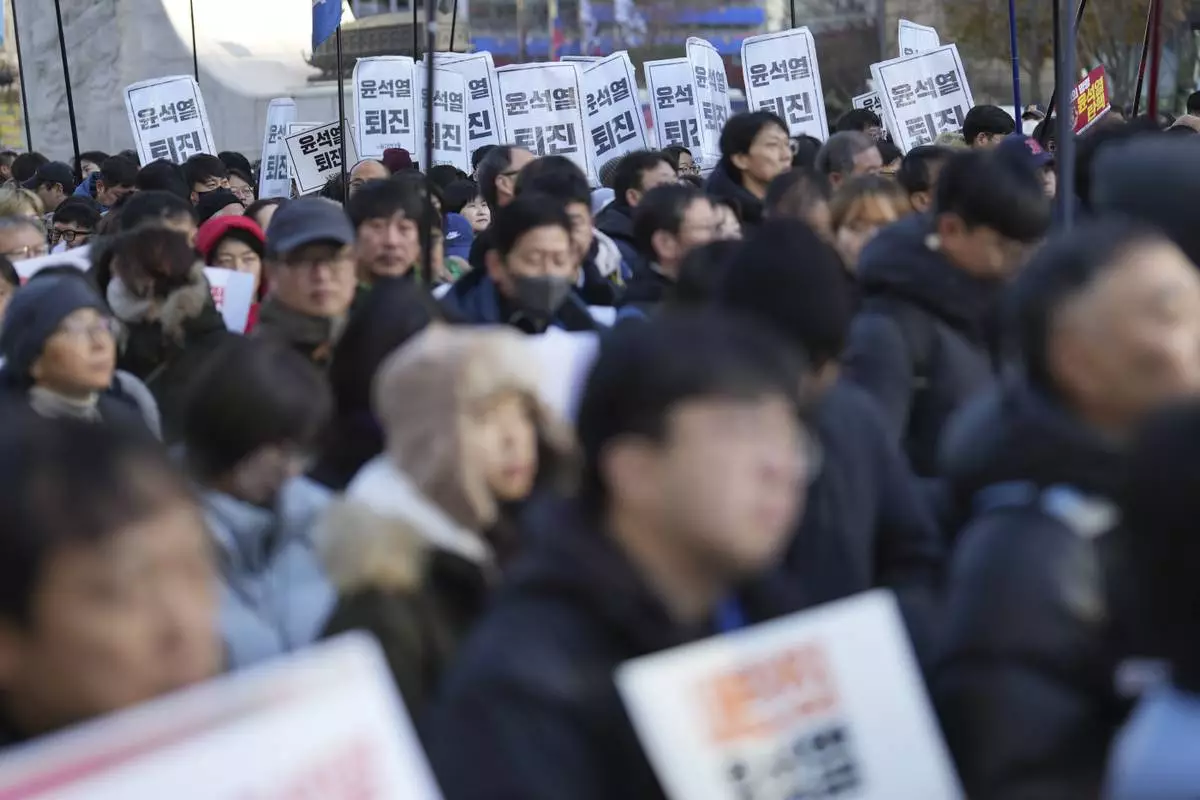
South Koreans hold signs reading "Resign Yoon Suk Yeol" during a rally in Seoul, South Korea, Wednesday, Dec. 4, 2024. (AP Photo/Lee Jin-man)
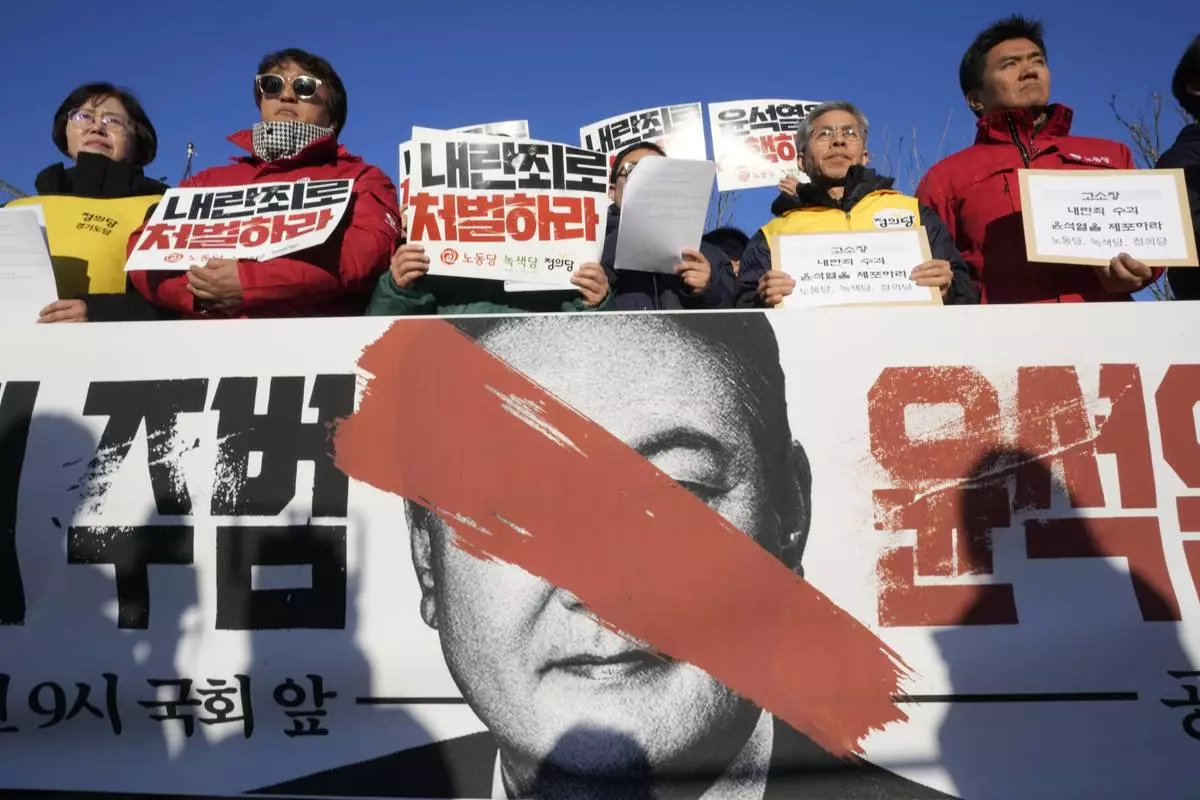
Protesters stage a rally to demand South Korean President Yoon Suk Yeol to step down in front of the National Assembly in Seoul, South Korea, Wednesday, Dec. 4, 2024. The signs read "Punish." (AP Photo/Ahn Young-joon)
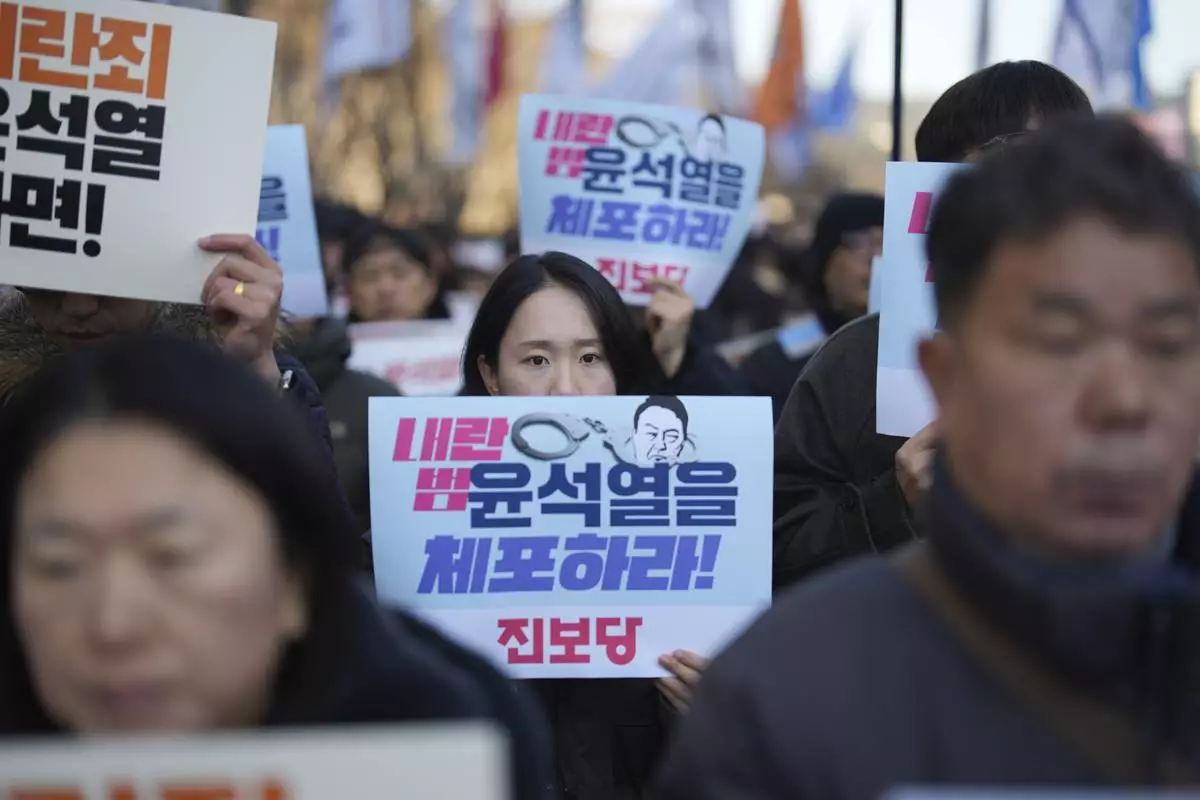
South Koreans hold signs reading "Arrest Yoon Suk Yeol" during a rally in Seoul, South Korea, Wednesday, Dec. 4, 2024. (AP Photo/Lee Jin-man)
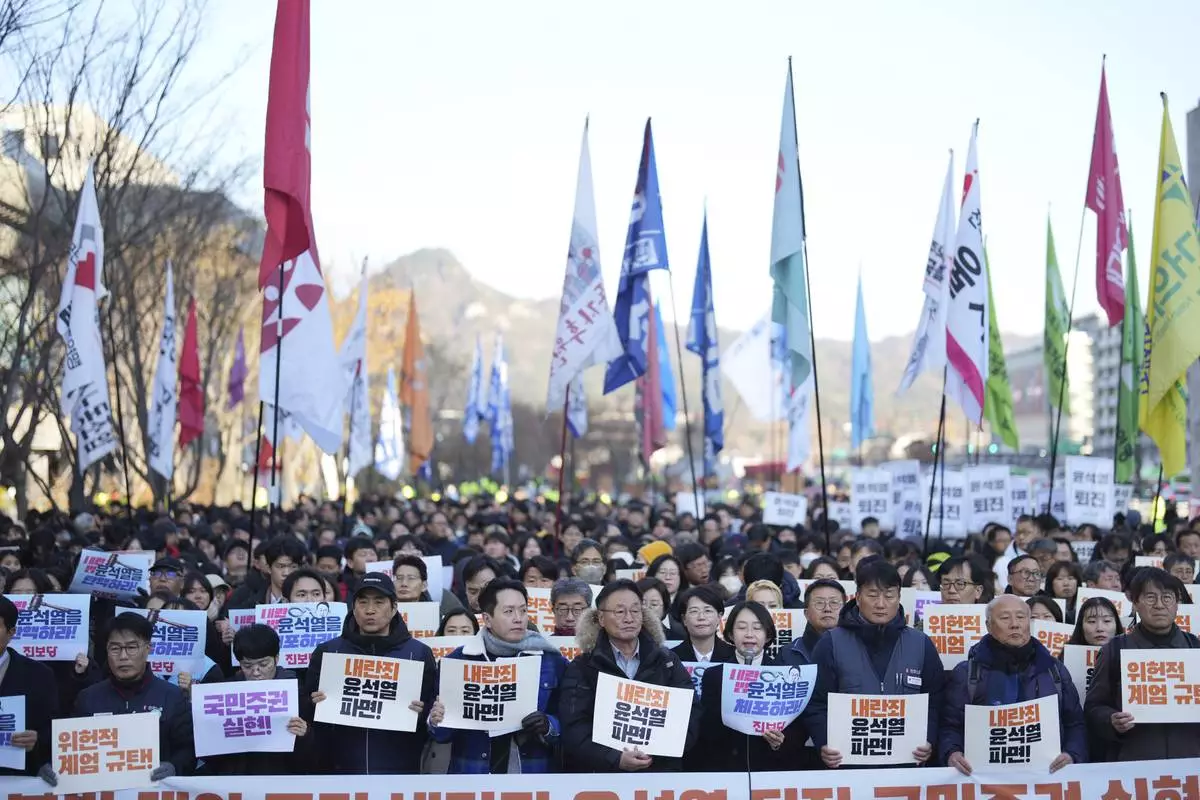
South Koreans hold signs reading "Expulsion of Yoon Suk Yeol" during a rally in Seoul, South Korea, Wednesday, Dec. 4, 2024. (AP Photo/Lee Jin-man)
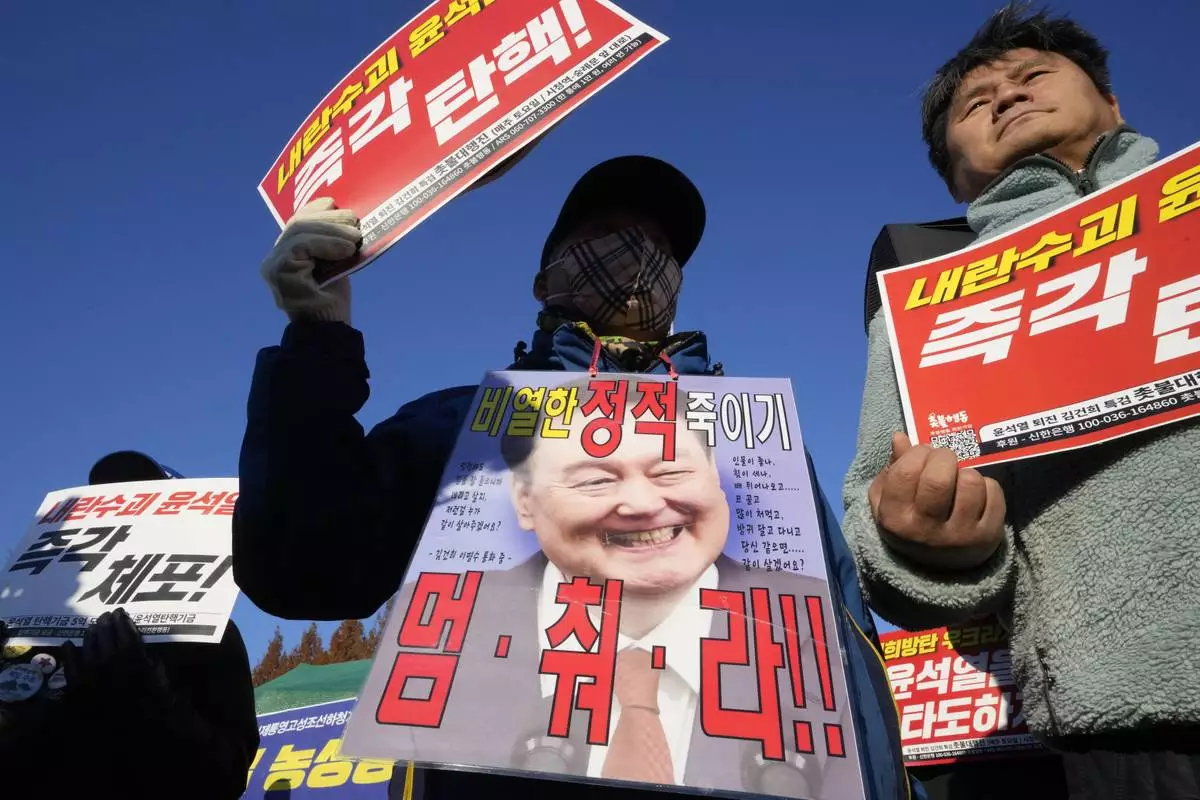
Protesters attend a rally to demand South Korean President Yoon Suk Yeol to step down in front of the National Assembly in Seoul, South Korea, Wednesday, Dec. 4, 2024. The signs read "Stop." (AP Photo/Ahn Young-joon)
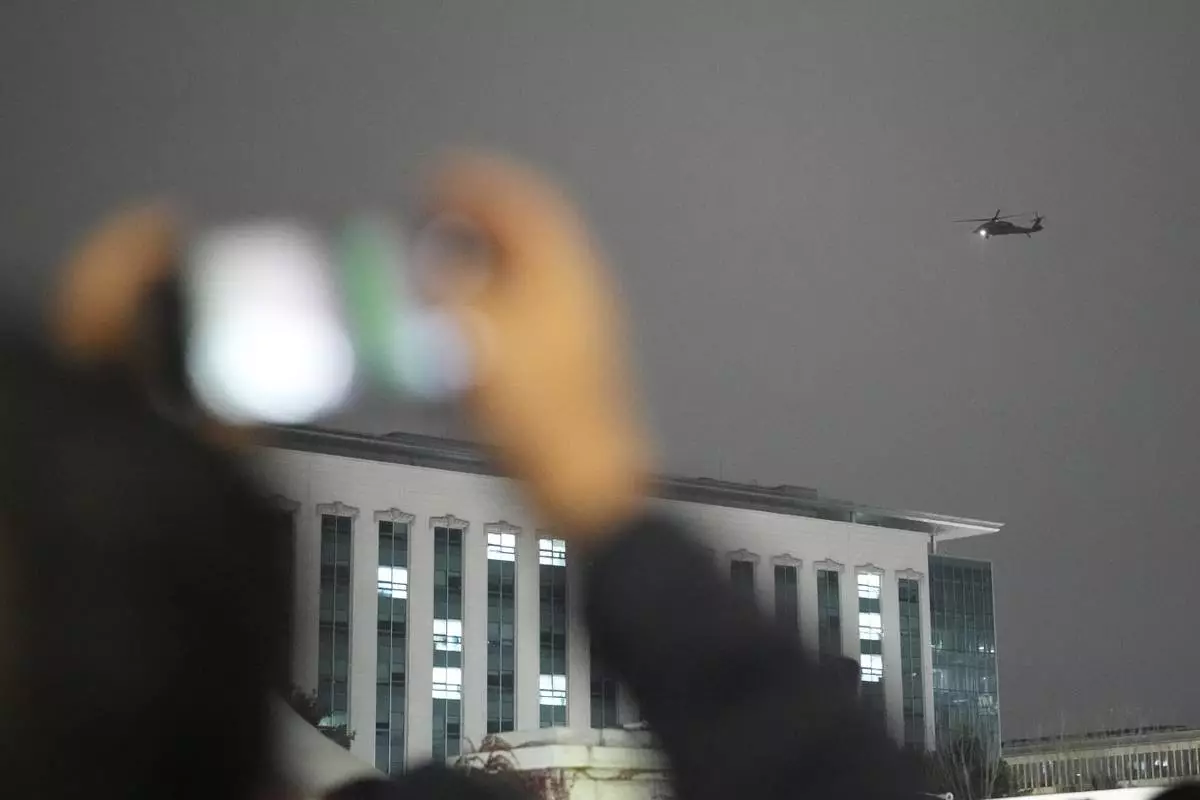
A helicopter flies over the National Assembly in Seoul, South Korea, Wednesday, Dec. 4, 2024. (AP Photo/Lee Jin-man)
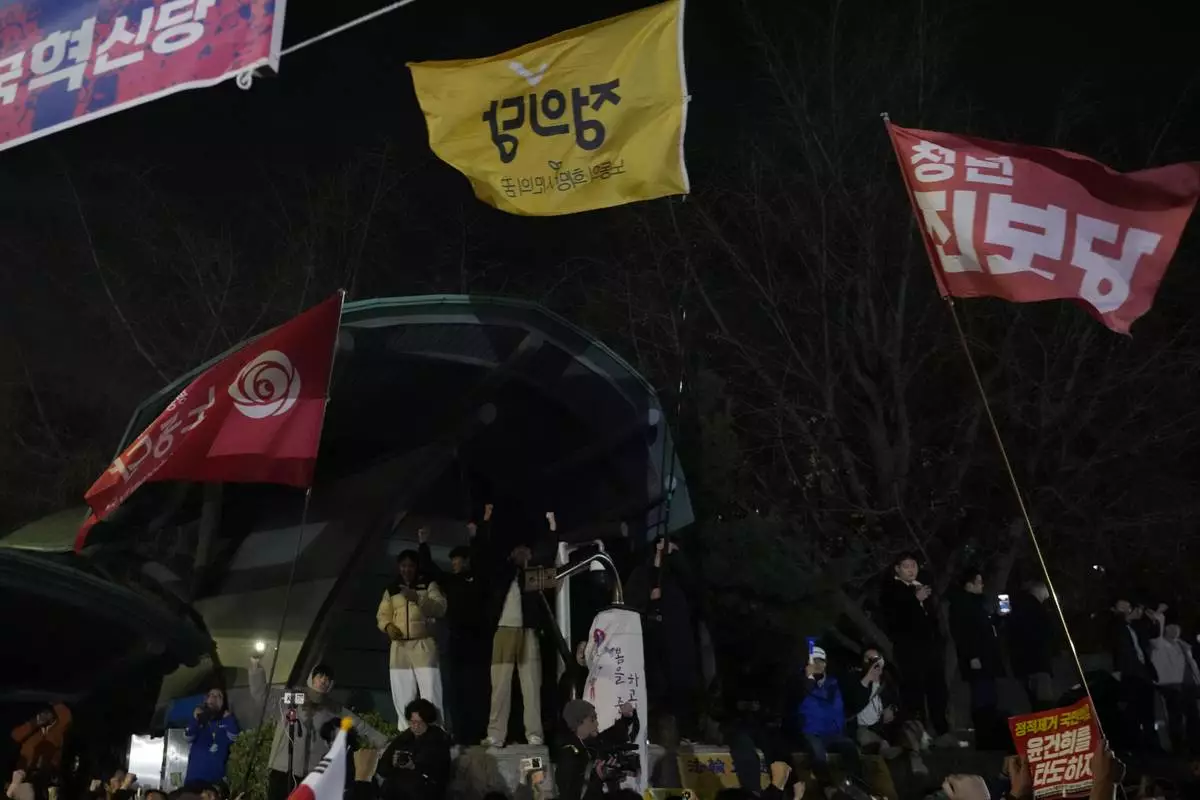
People gather in front of the National Assembly in Seoul, South Korea, Wednesday, Dec. 4, 2024. (AP Photo/Ahn Young-joon)
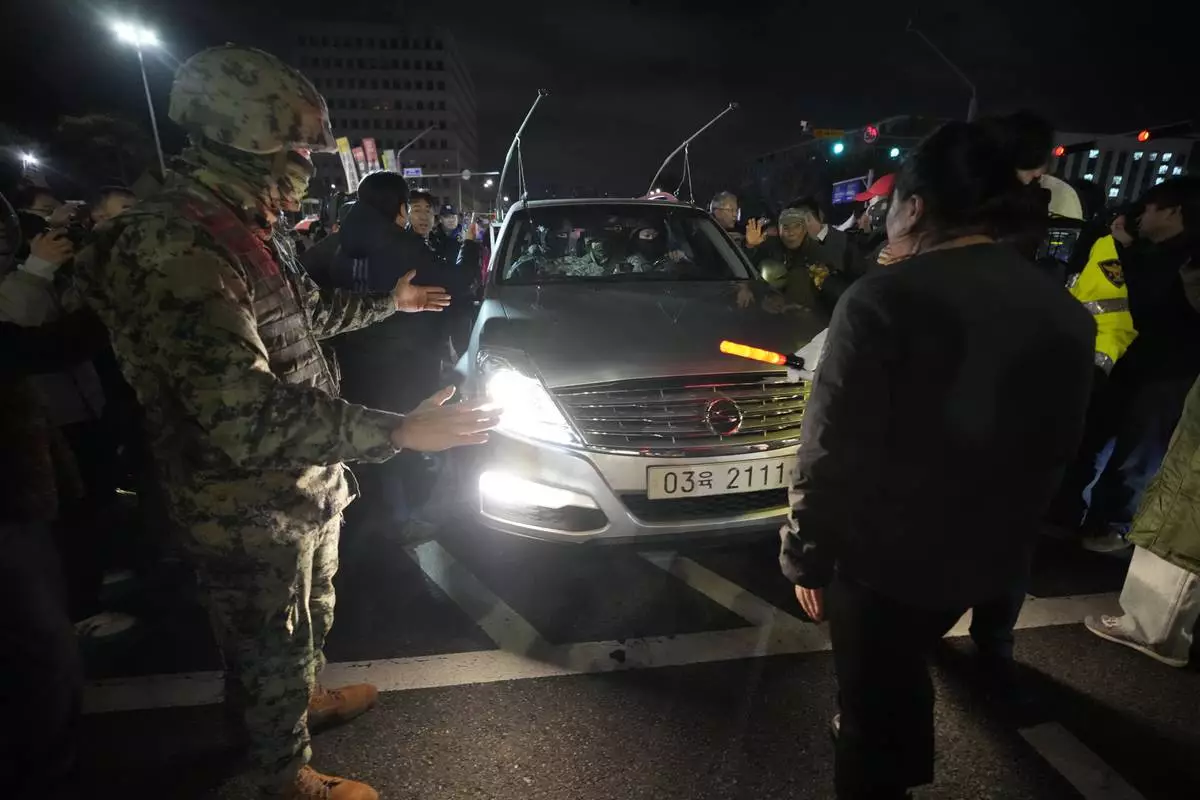
People bock a martial law vehicle as they gather to demand South Korean President Yoon Suk Yeol to step down in front of the National Assembly in Seoul, South Korea, Wednesday, Dec. 4, 2024. (AP Photo/Ahn Young-joon)
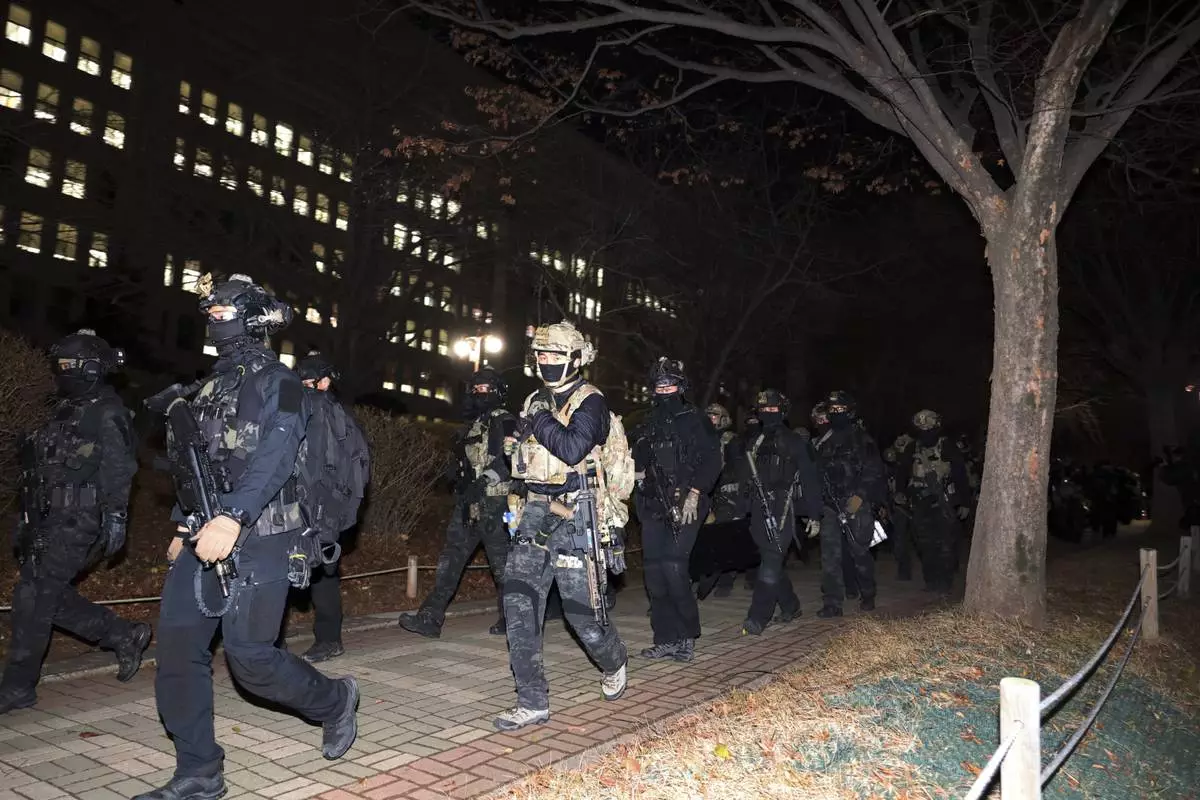
South Korean martial law soldiers leave the National Assembly in Seoul, South Korea, Wednesday, Dec. 4, 2024. (Kim Ju-sung/Yonhap via AP)
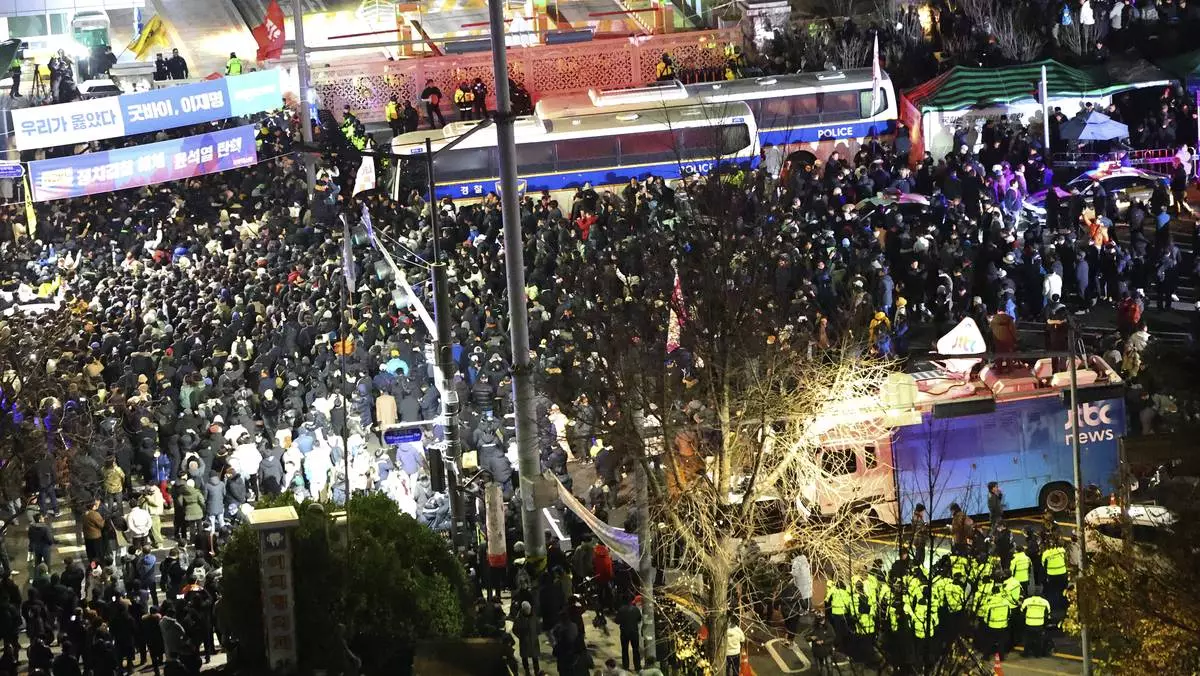
People gather to demand South Korean President Yoon Suk Yeol step down in front of the National Assembly in Seoul, South Korea, Wednesday, Dec. 4, 2024. (Kim Do-hoon/Yonhap via AP)
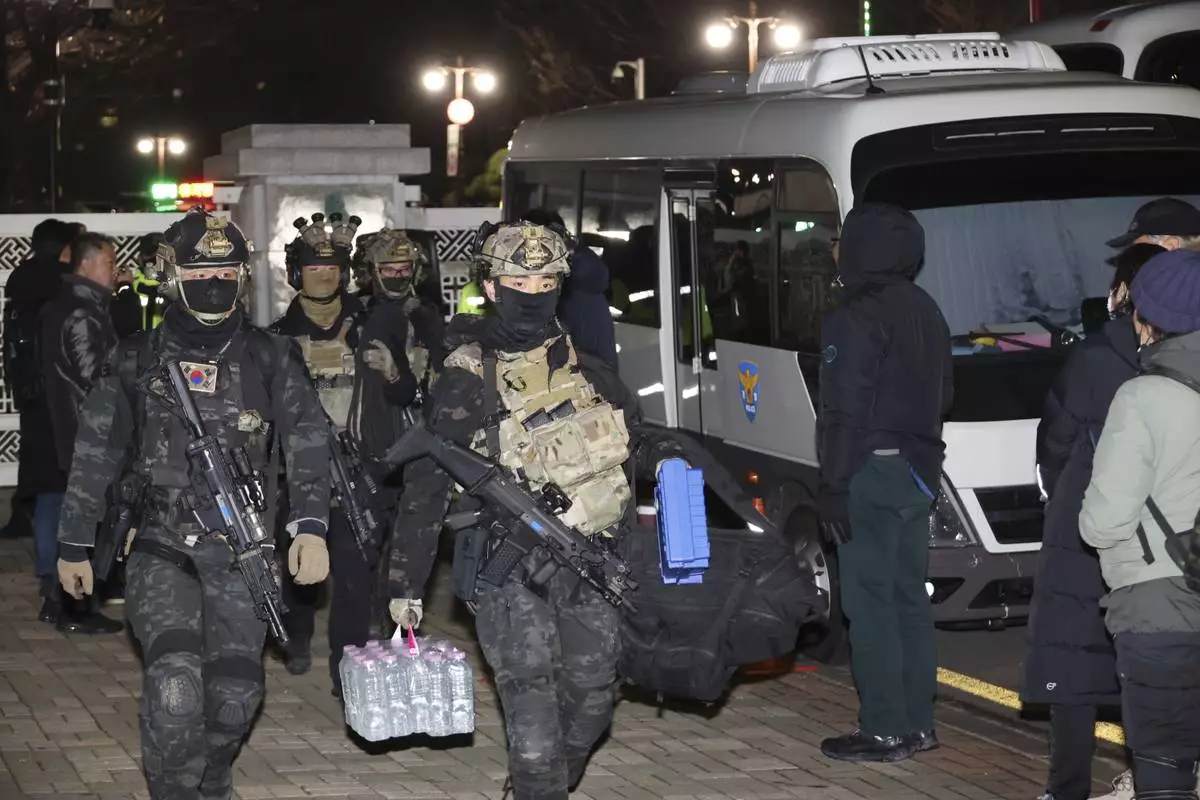
South Korean martial law soldiers leave the National Assembly in Seoul, South Korea, Wednesday, Dec. 4, 2024. (Kim Ju-sung/Yonhap via AP)
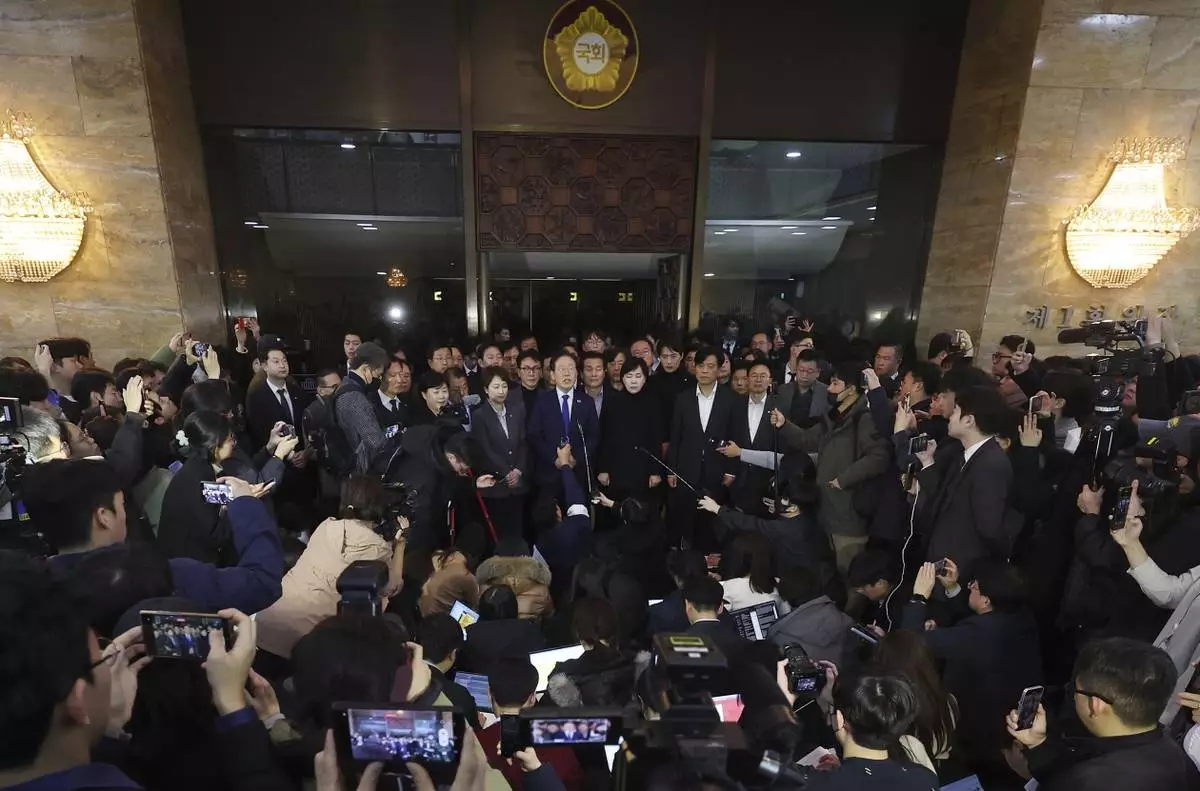
South Korea's main opposition Democratic Party leader Lee Jae-myung, top center, speaks at the National Assembly in Seoul, South Korea, Wednesday, Dec. 4, 2024. (Kim Ju-hyung/Yonhap via AP)
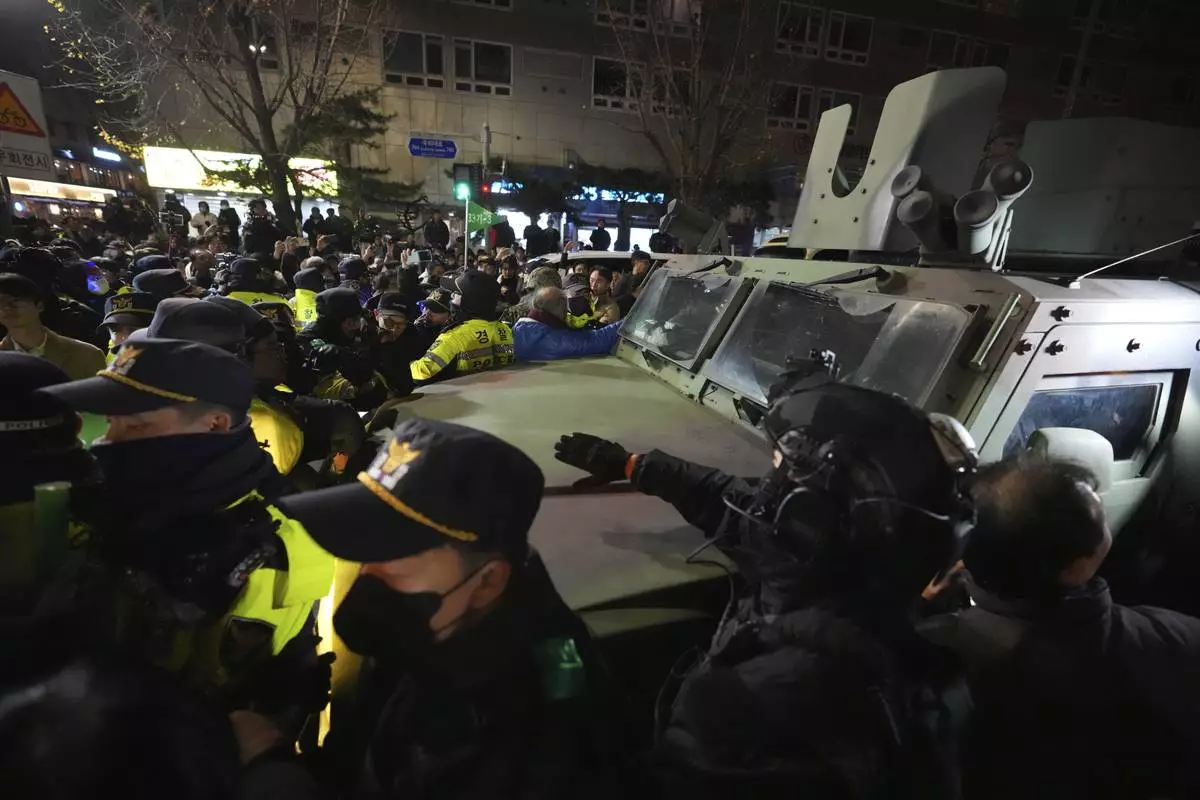
Military vehicle is escorted by police officers as people try to block outside of the National Assembly in Seoul, South Korea, Wednesday, Dec. 4, 2024. (AP Photo/Lee Jin-man)
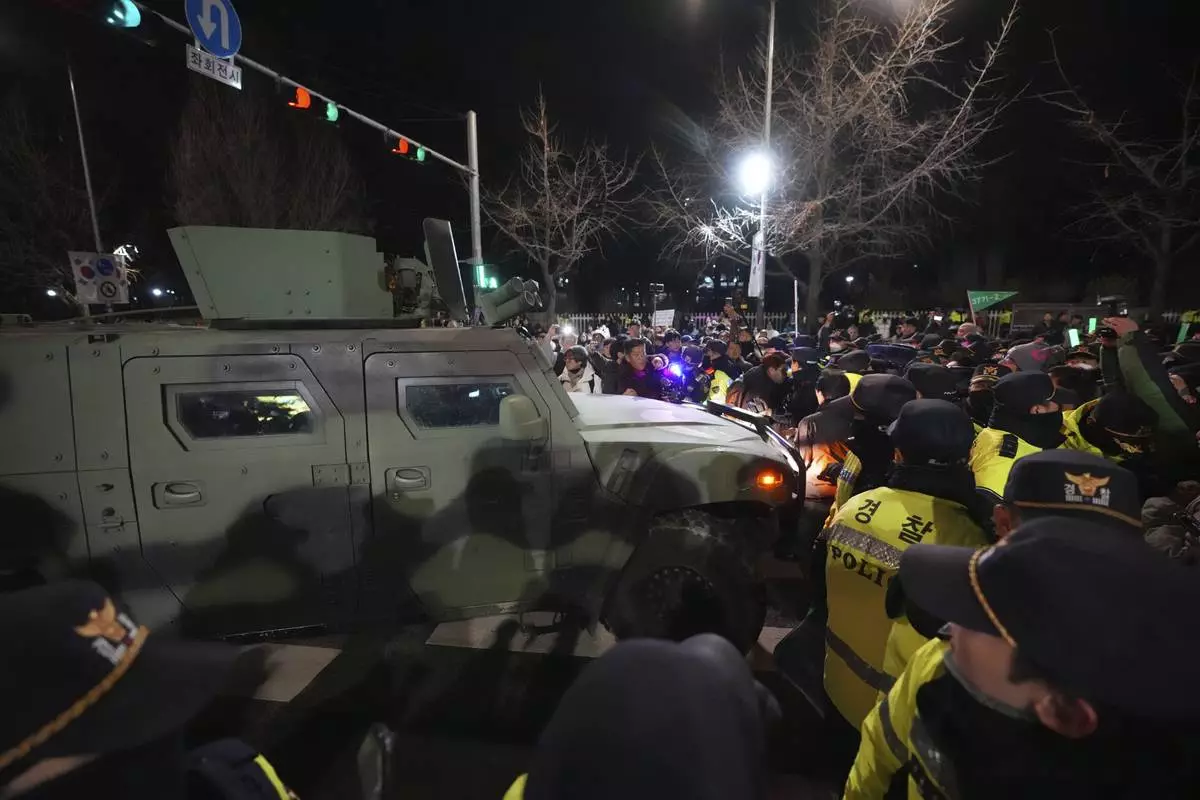
Military vehicle is escorted by police officers as people try to block outside of the National Assembly in Seoul, South Korea, Wednesday, Dec. 4, 2024. (AP Photo/Lee Jin-man)
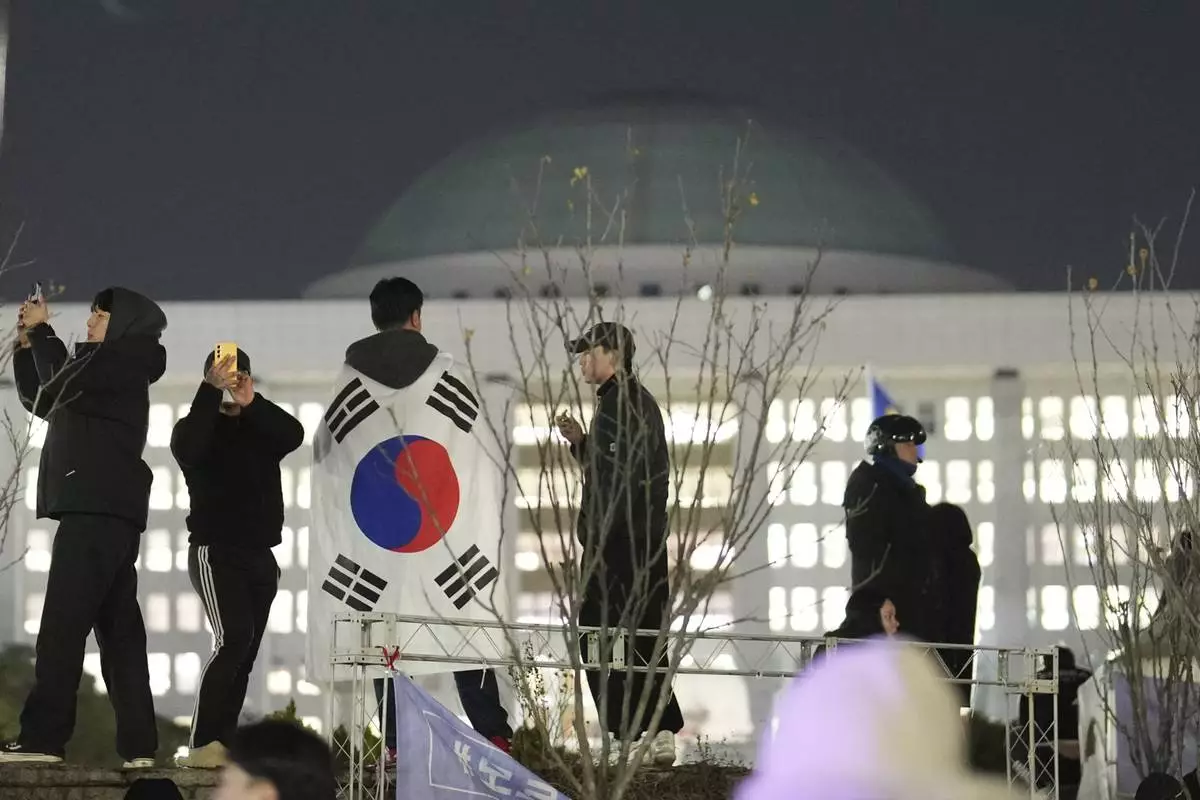
A man wearing a national flag stands on the wall of the National Assembly in Seoul, South Korea, Wednesday, Dec. 4, 2024. (AP Photo/Lee Jin-man)
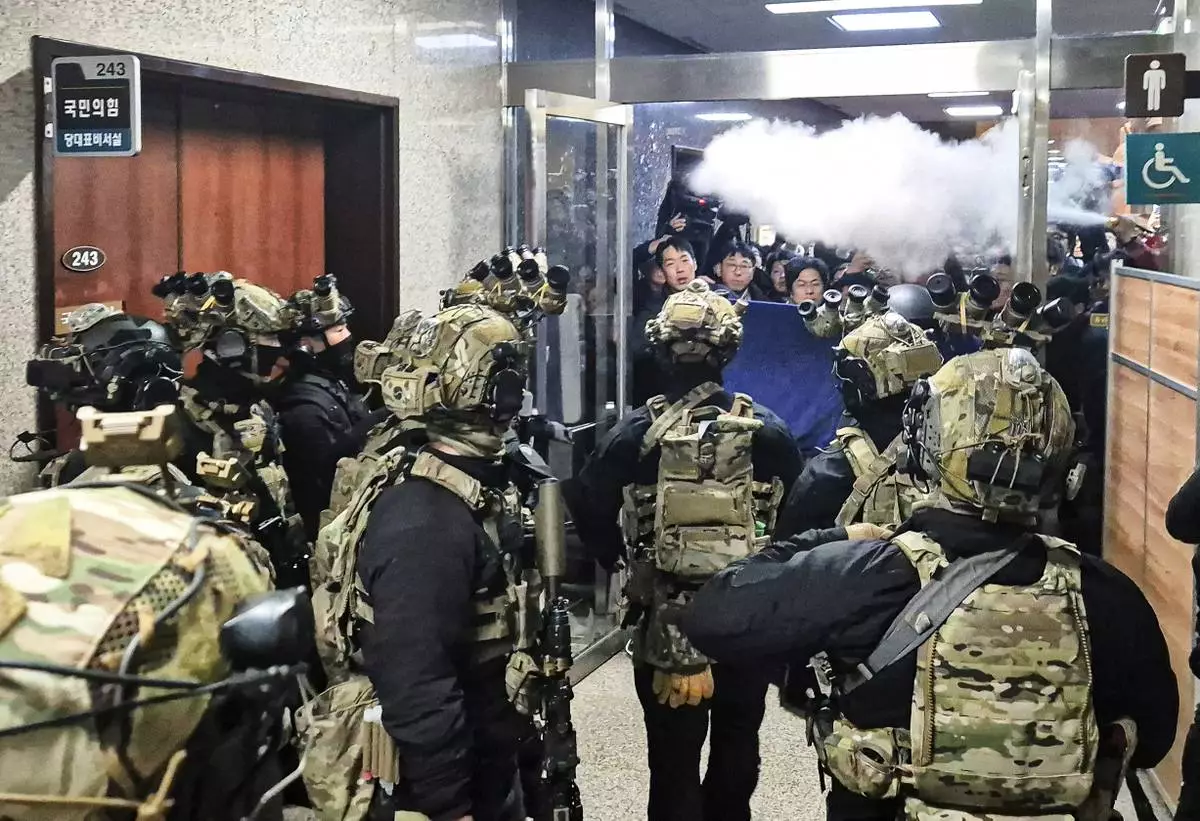
A National Assembly staff sprays fire extinguishers to block soldiers entering the main hall of the National Assembly in Seoul, South Korea, Wednesday, Dec. 4, 2024. (Jo Da-un/Yonhap via AP)
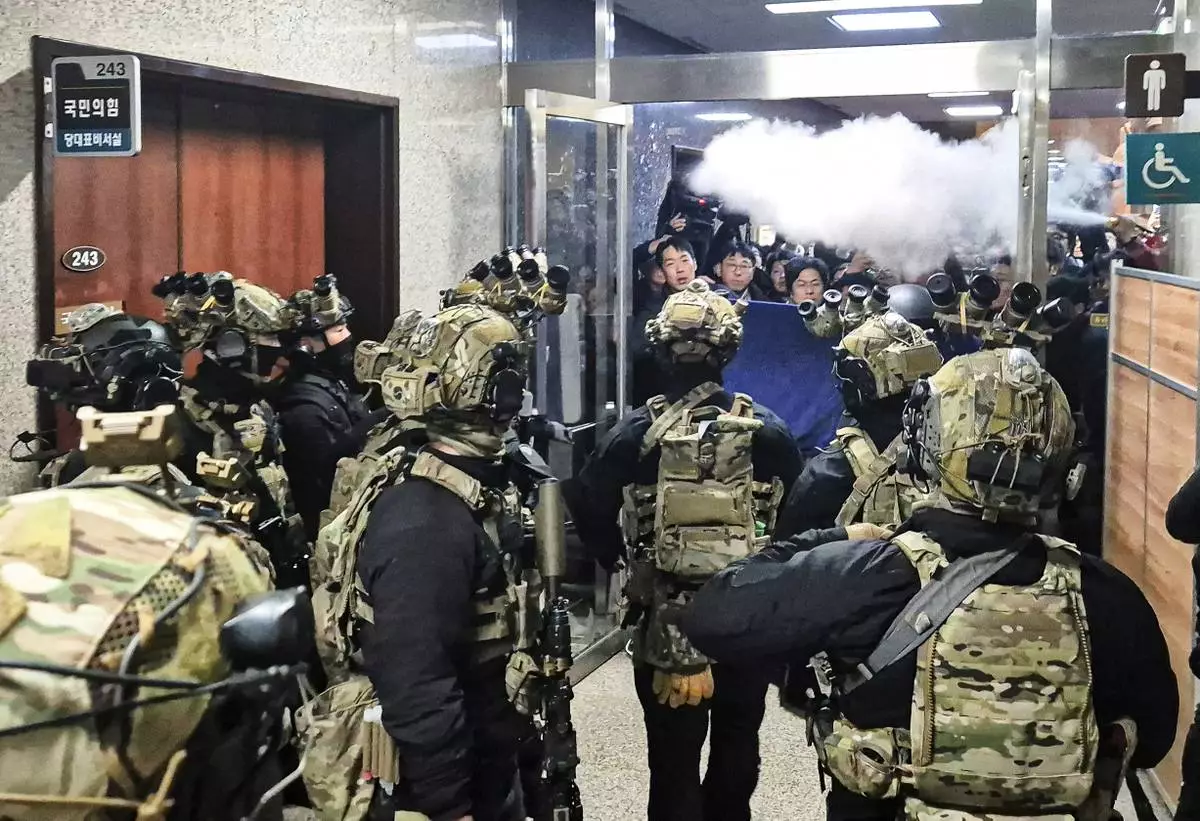
A National Assembly staff sprays fire extinguishers to block soldiers entering the main hall of the National Assembly in Seoul, South Korea, Wednesday, Dec. 4, 2024. (Jo Da-un/Yonhap via AP)
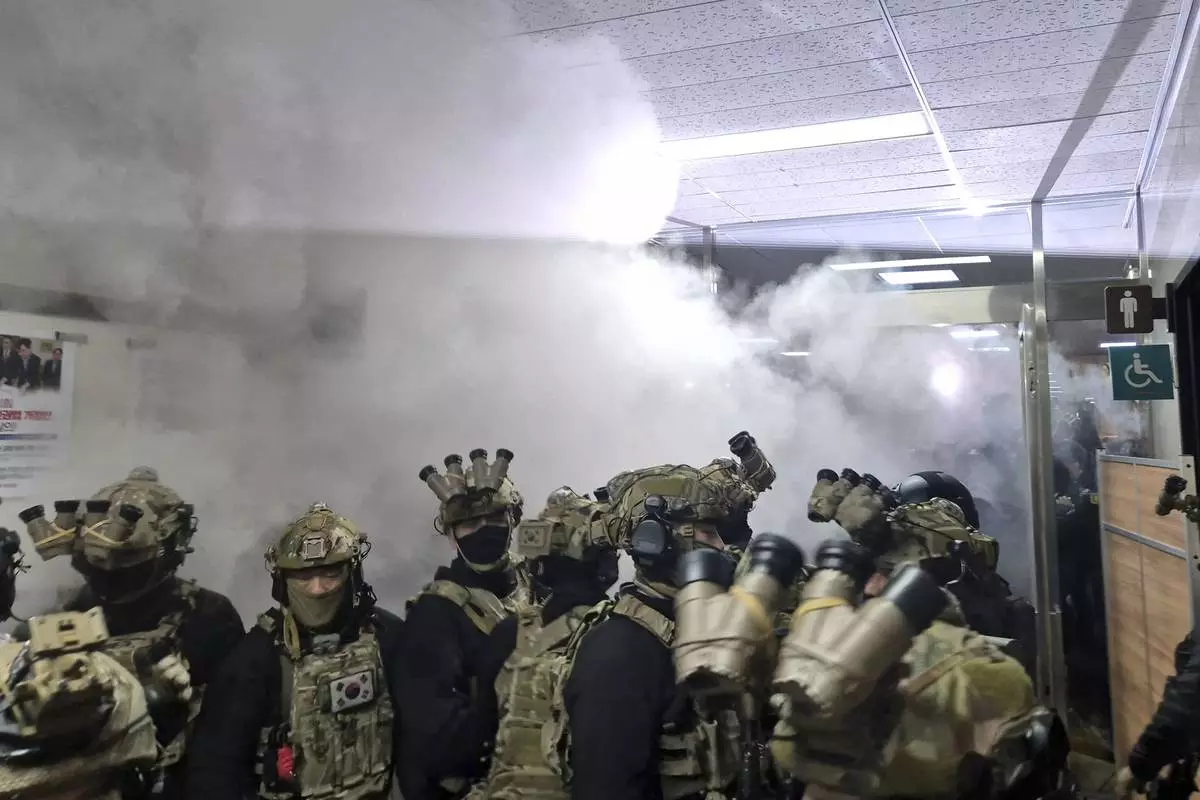
A National Assembly staff sprays fire extinguishers to block soldiers entering the main hall of the National Assembly in Seoul, South Korea, Wednesday, Dec. 4, 2024. (Jo Da-un/Yonhap via AP)
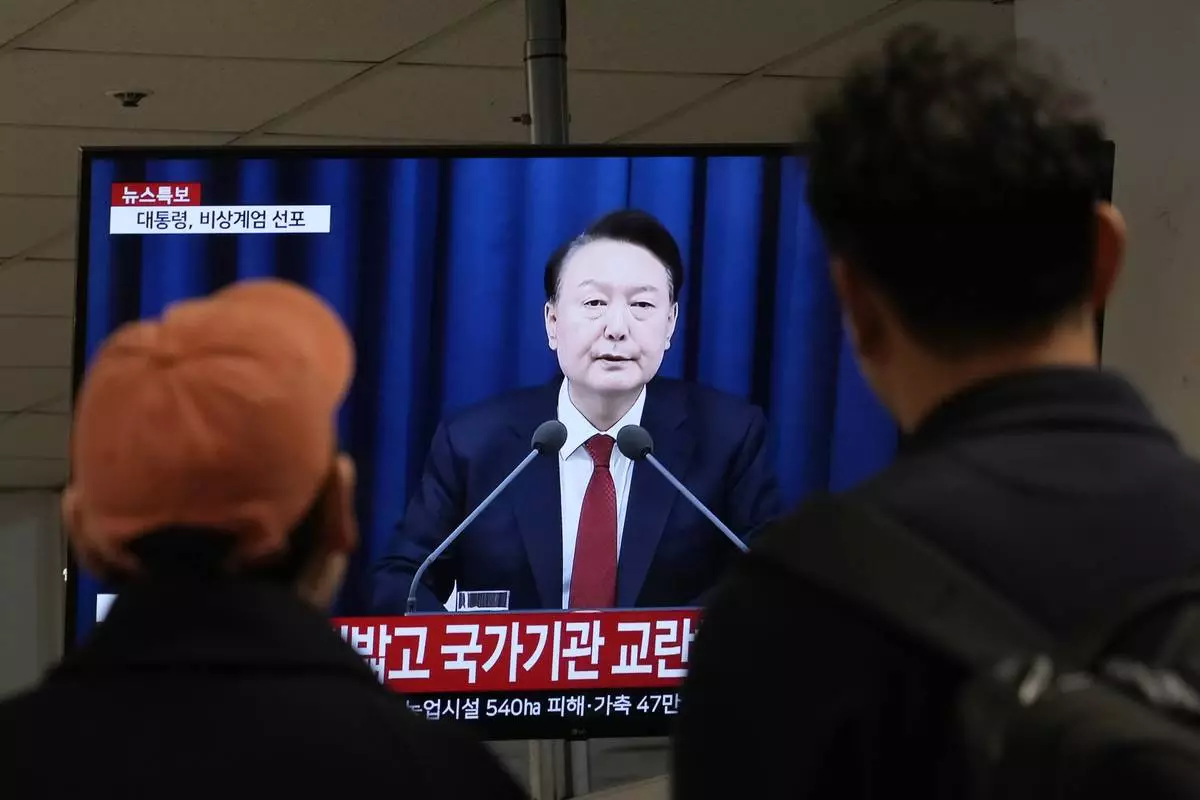
People watch a TV screen showing South Korean President Yoon Suk Yeol's televised briefing at a bus terminal in Seoul, South Korea, Tuesday, Dec. 3, 2024. (AP Photo/Ahn Young-joon)
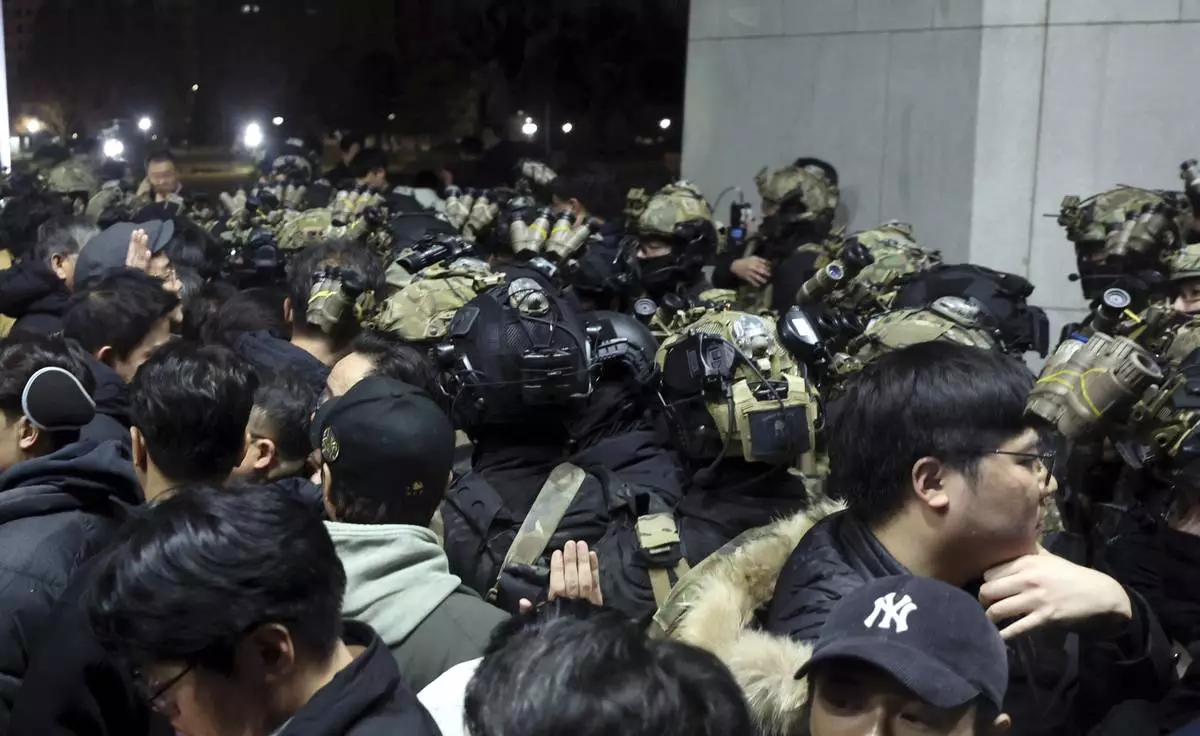
South Korean martial law soldiers try to enter the National Assembly compound in Seoul, South Korea, Wednesday, Dec. 4, 2024. (Cho Sung-bong/Newsis via AP)
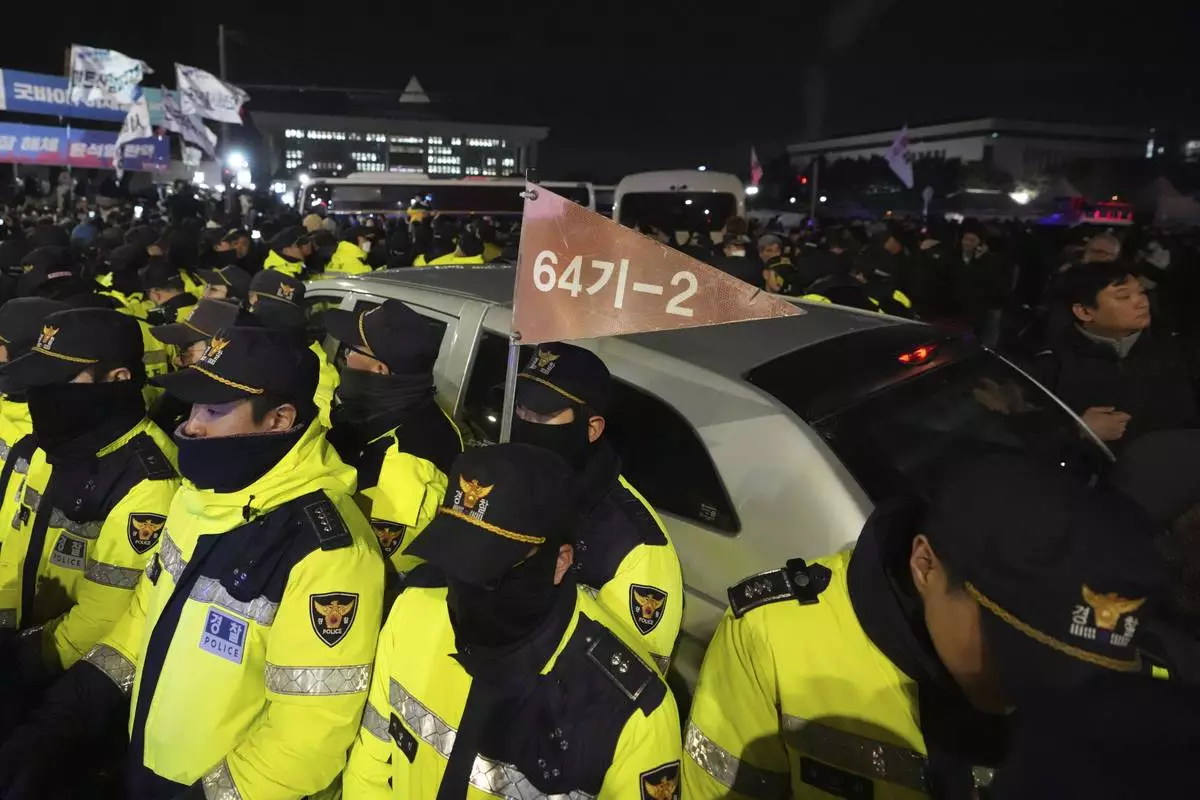
Police officers stand outside the National Assembly in Seoul, South Korea, Wednesday, Dec. 4, 2024. (AP Photo/Lee Jin-man)
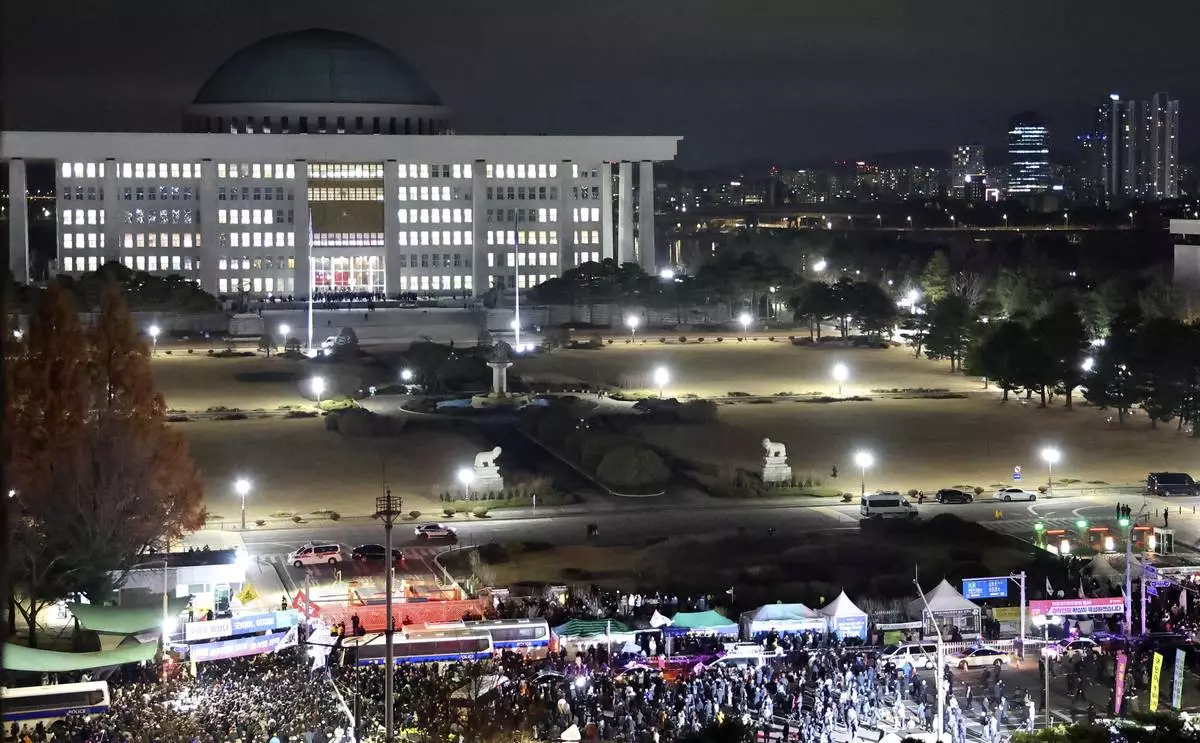
People gather to demand South Korean President Yoon Suk Yeol to step down in front of the National Assembly in Seoul, South Korea, Wednesday, Dec. 4, 2024. (Kim Do-hoon/Yonhap via AP)
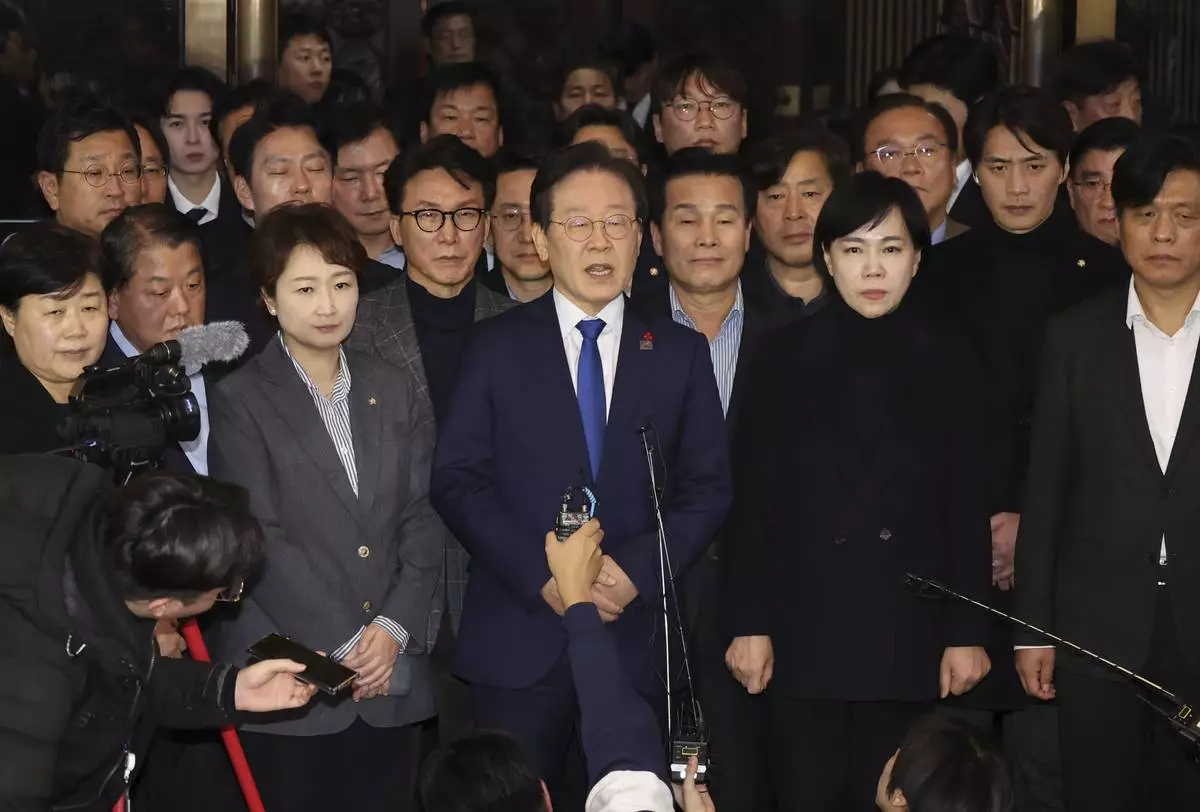
South Korea's main opposition Democratic Party leader Lee Jae-myung, center, speaks at the National Assembly in Seoul, South Korea, Wednesday, Dec. 4, 2024. (Kim Ju-hyung/Yonhap via AP)
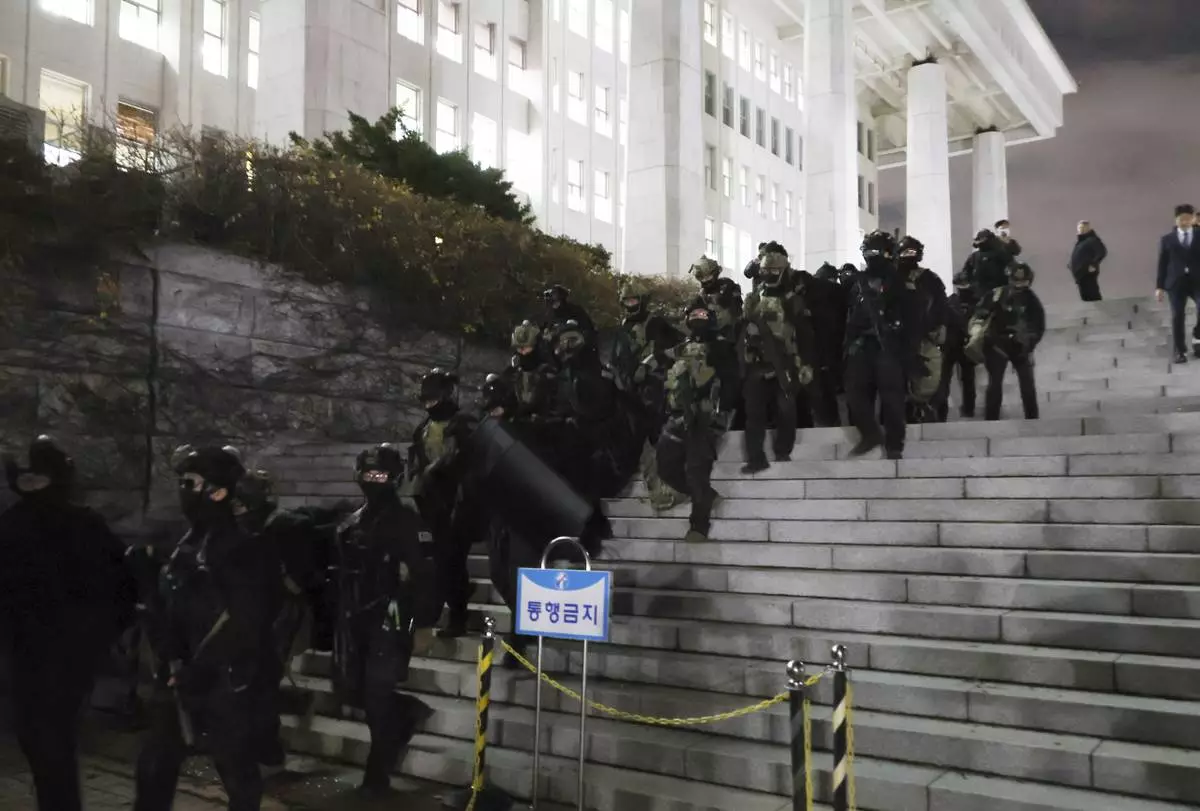
South Korean martial law soldiers leave the National Assembly in Seoul, South Korea, Wednesday, Dec. 4, 2024. (Kim Ju-sung/Yonhap via AP)
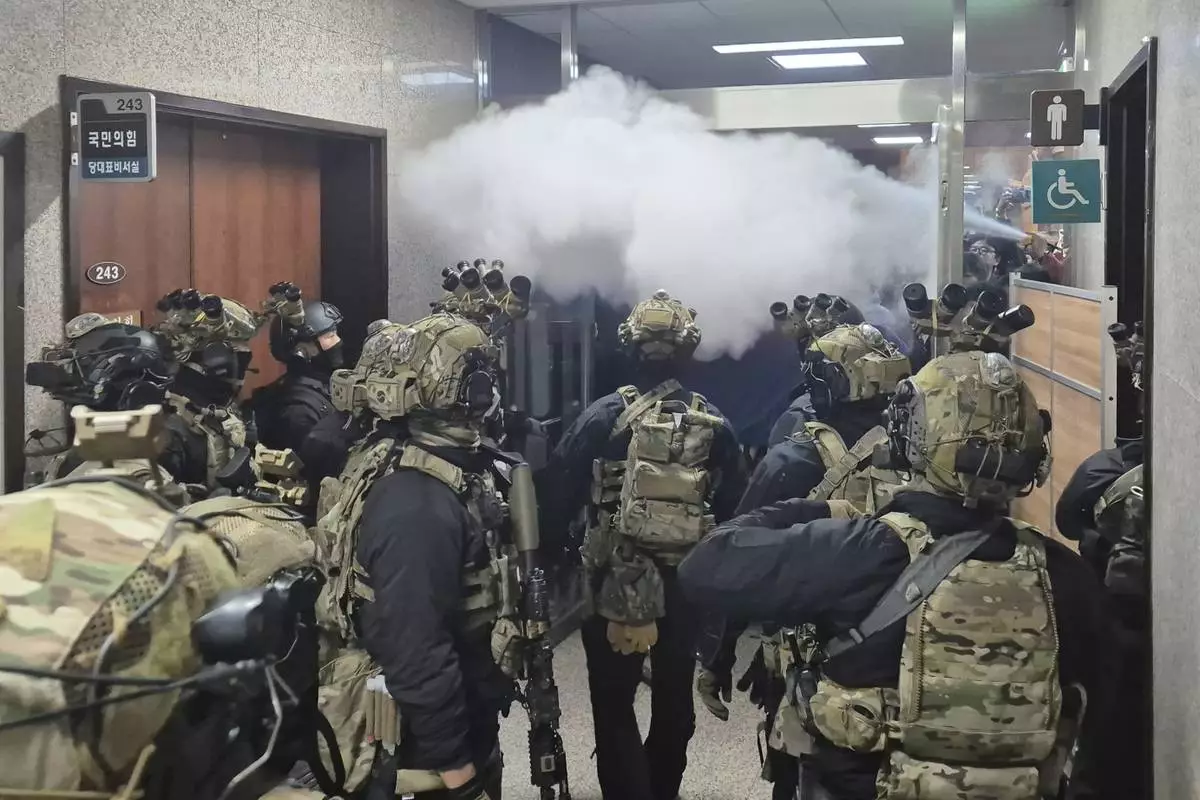
National Assembly employees spray a fire extinguisher towards soldiers at the National Assembly in Seoul, South Korea, Wednesday, Dec. 4, 2024. (Cho Da-un/Yonhap via AP)












